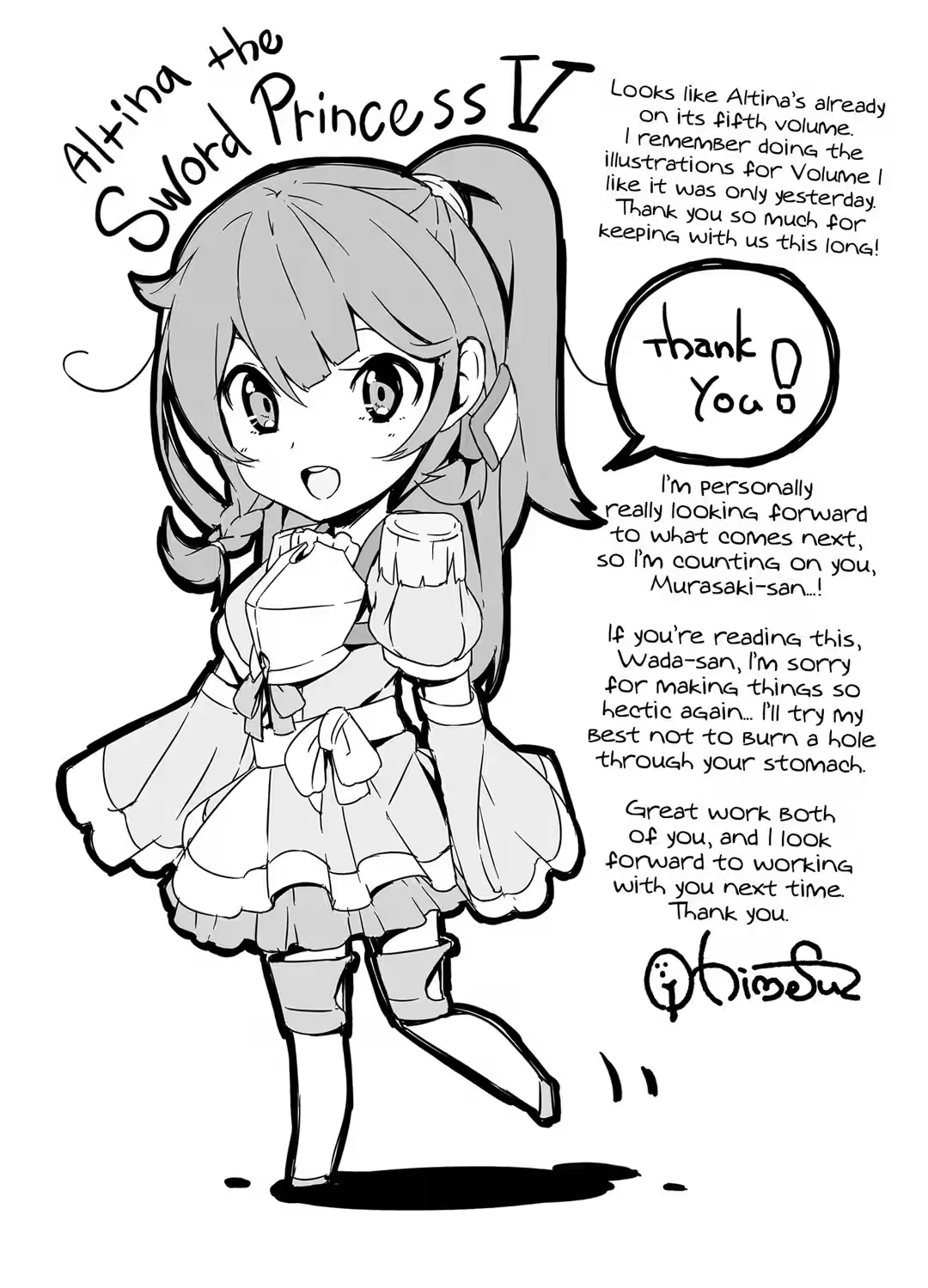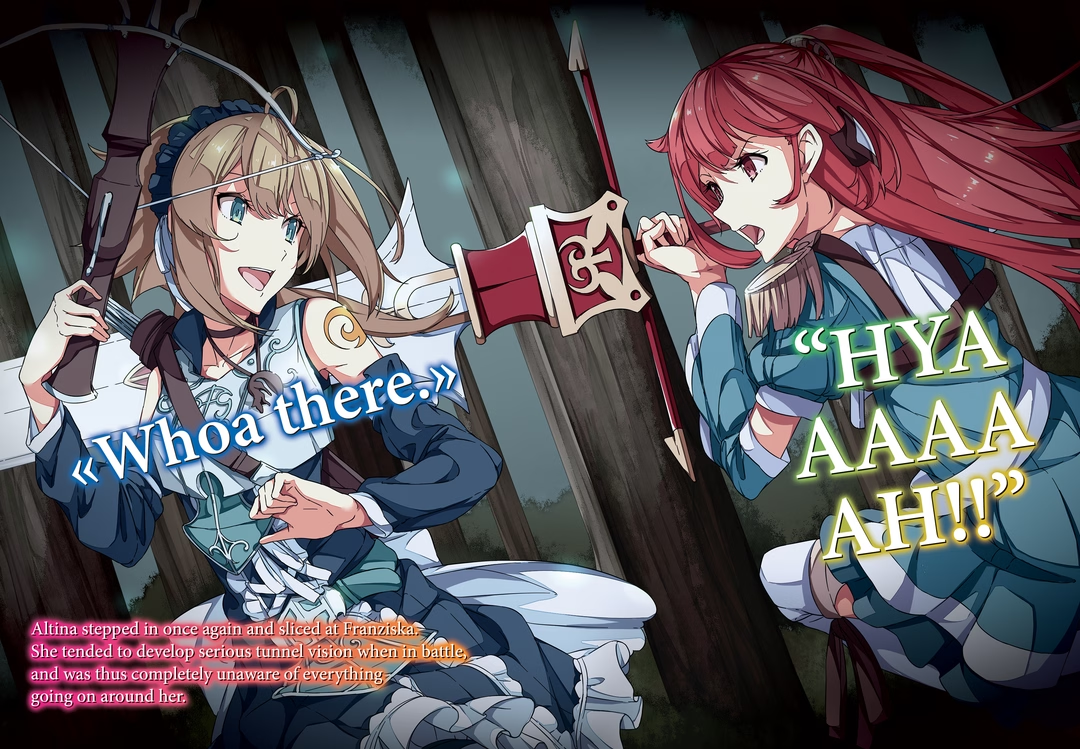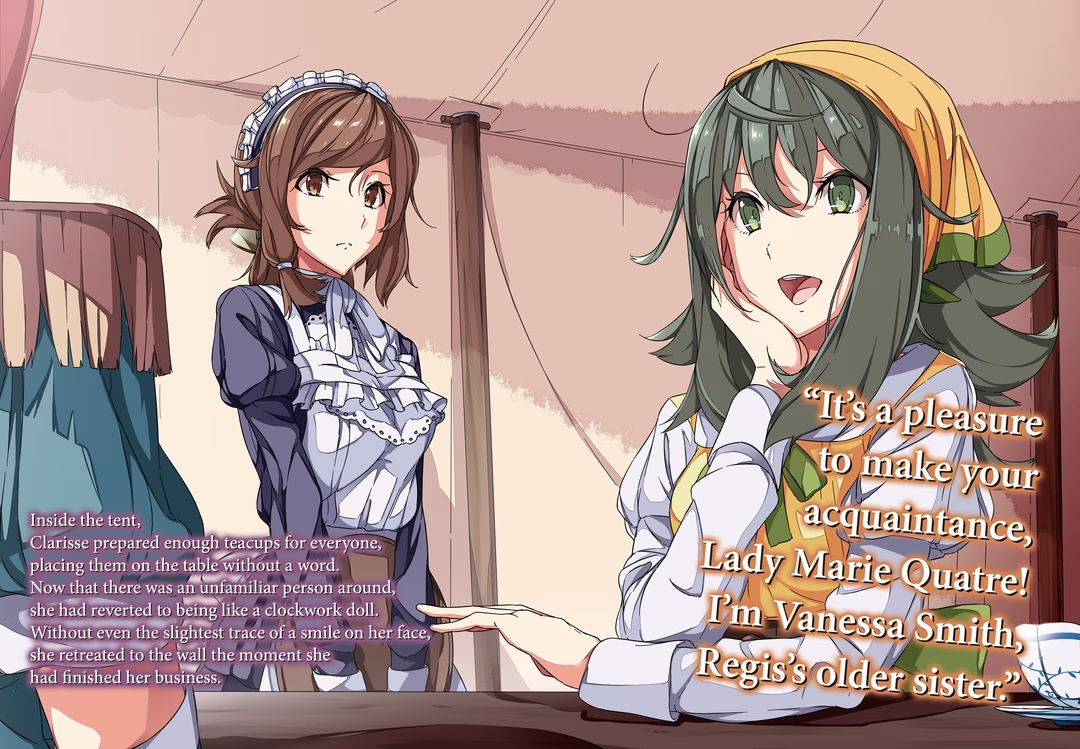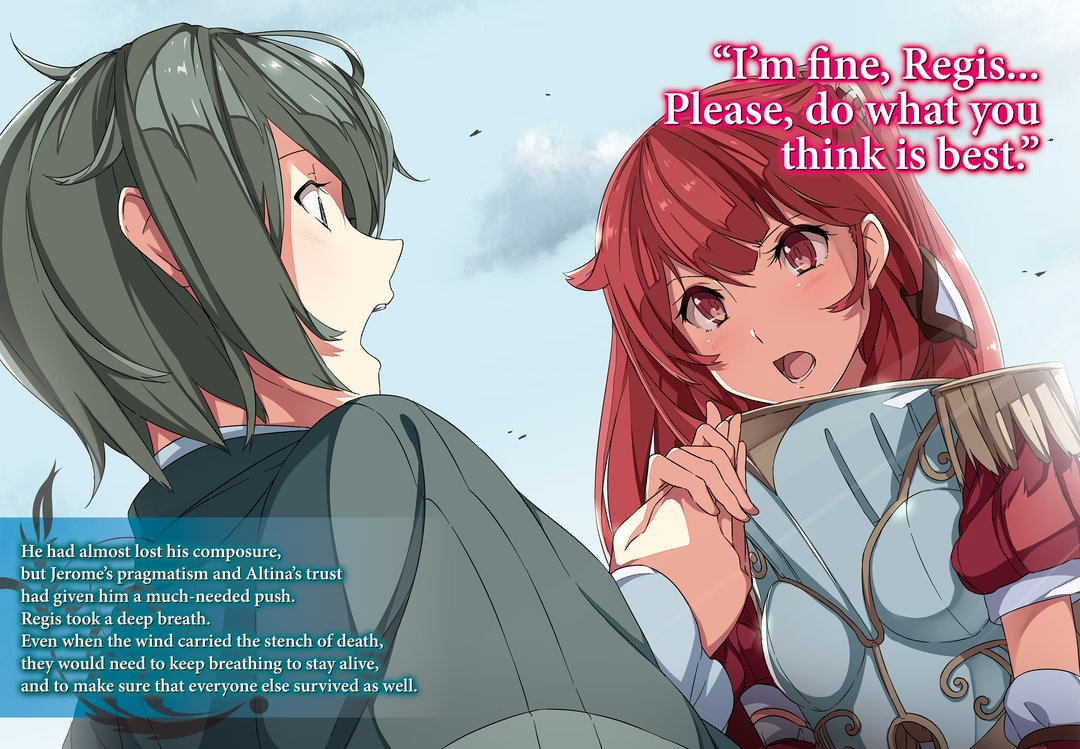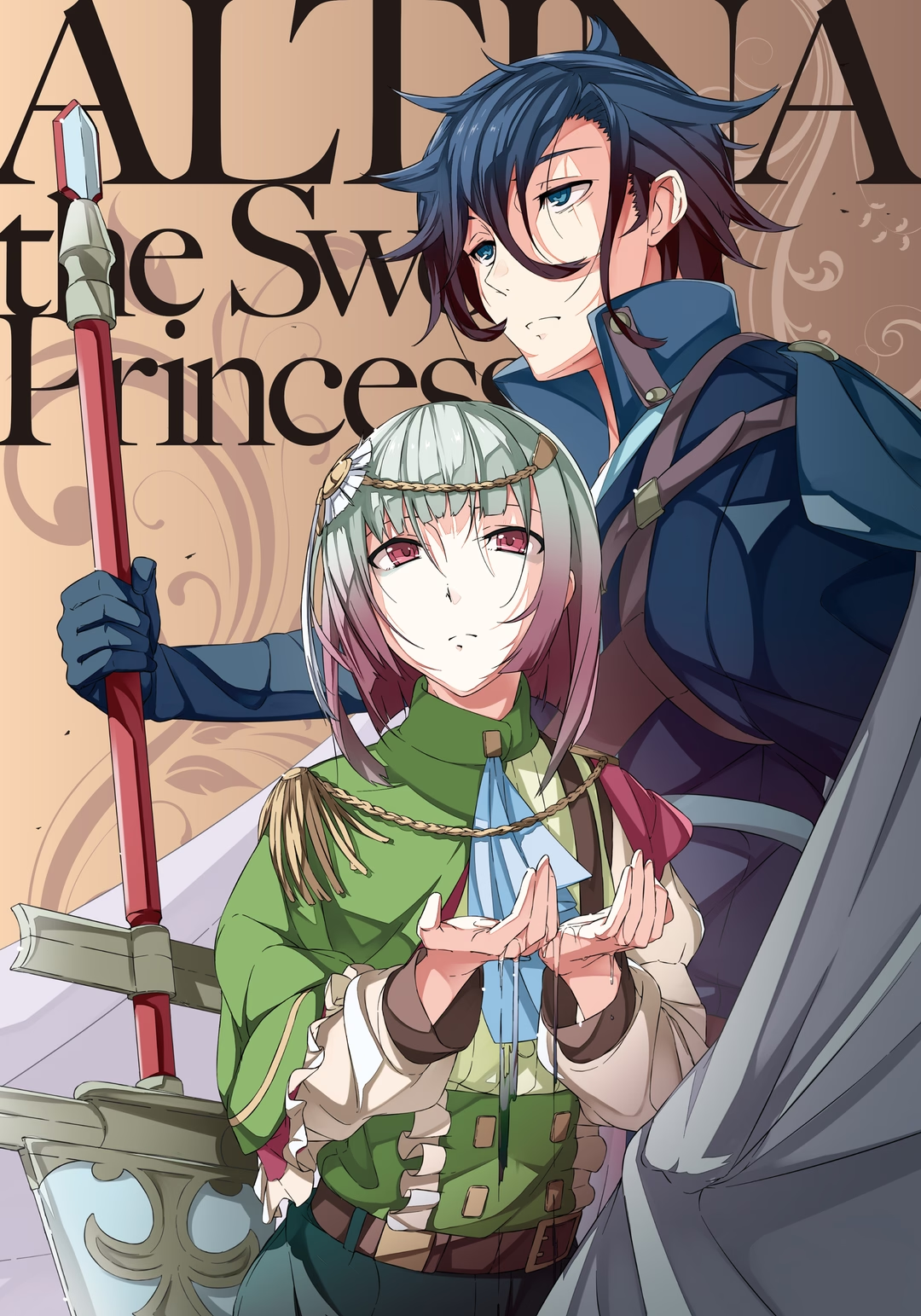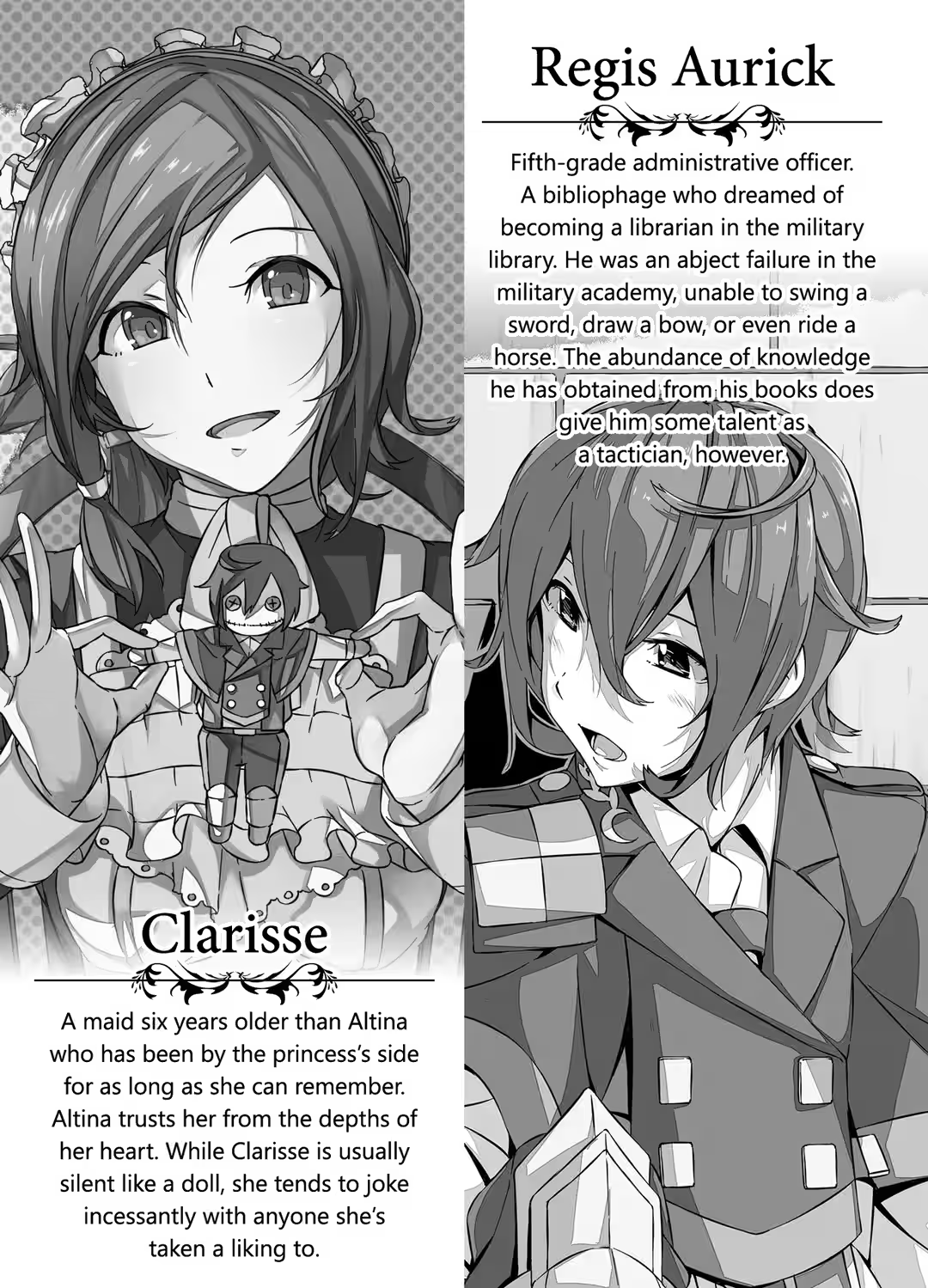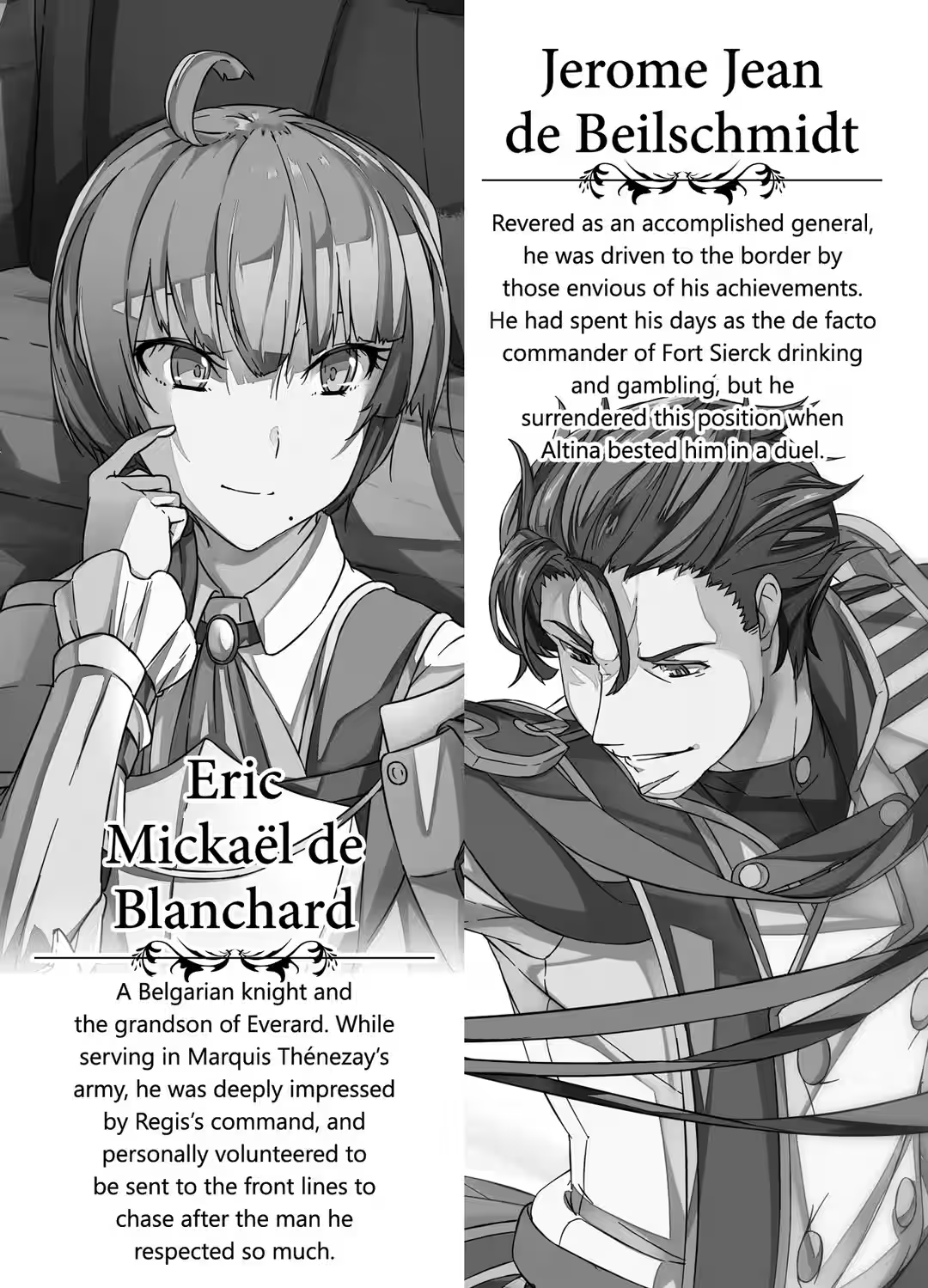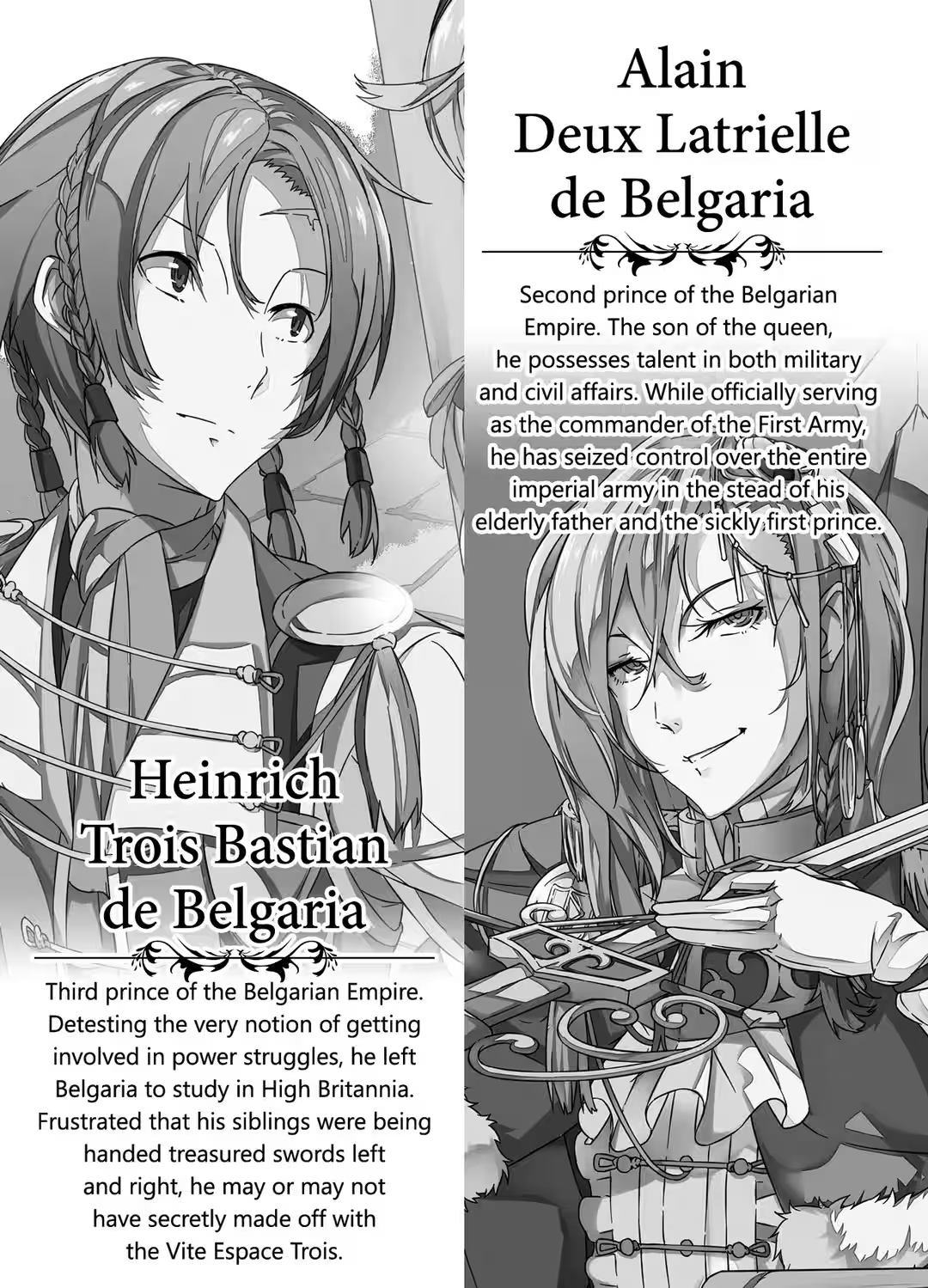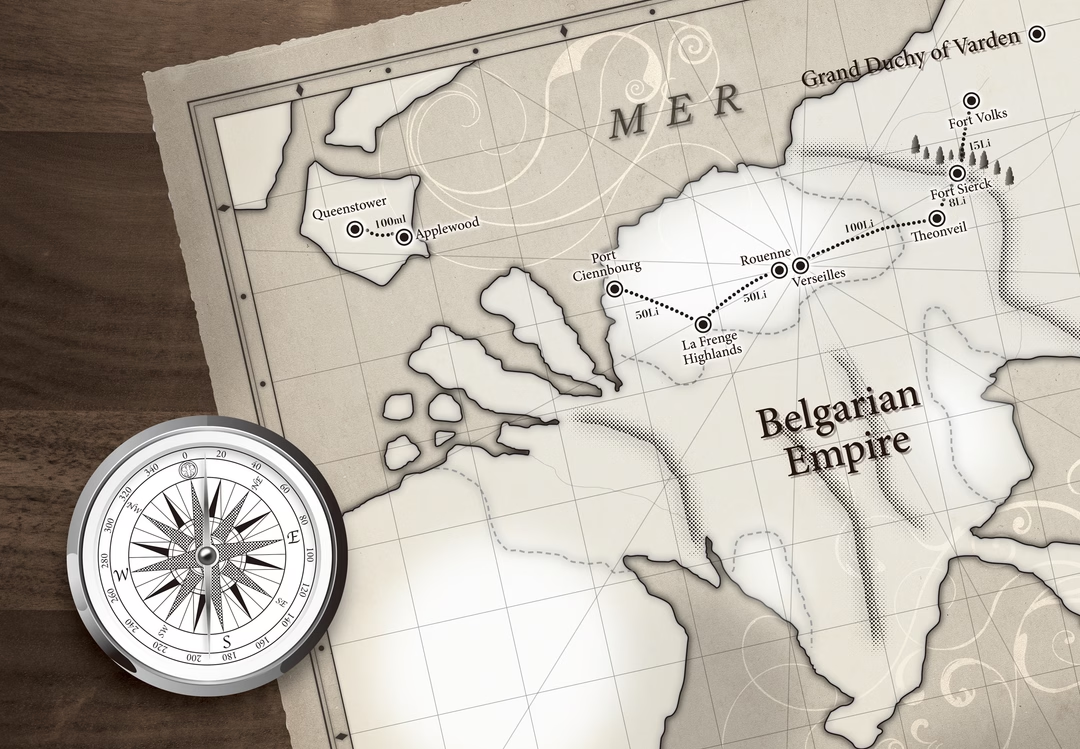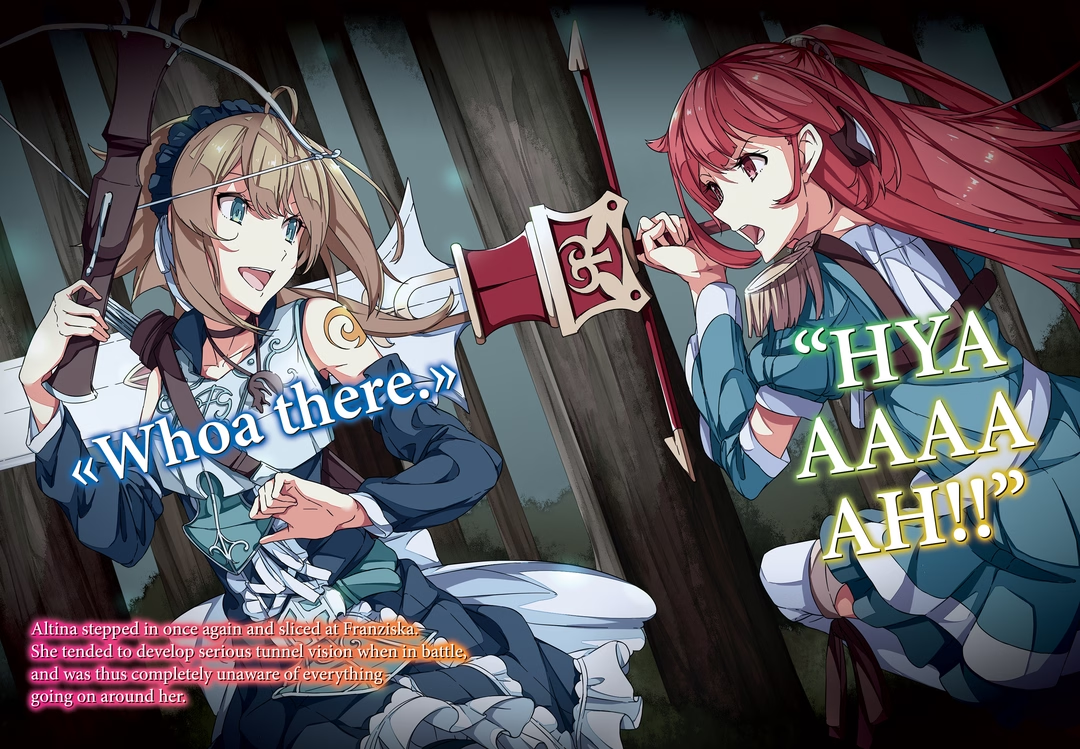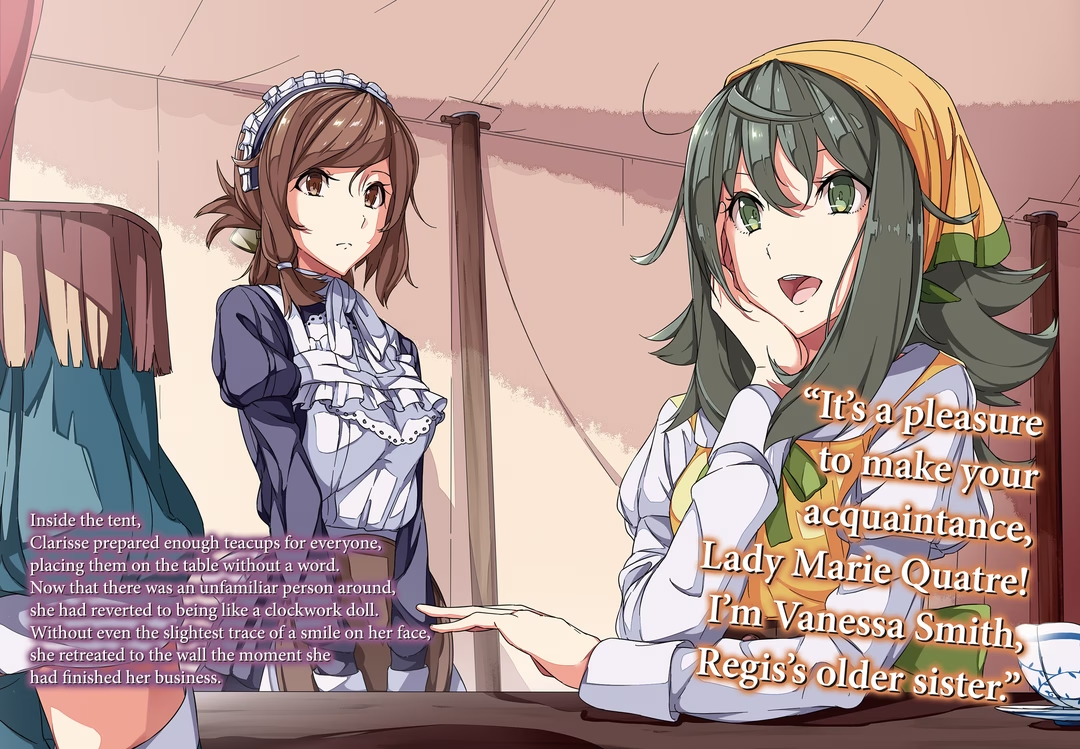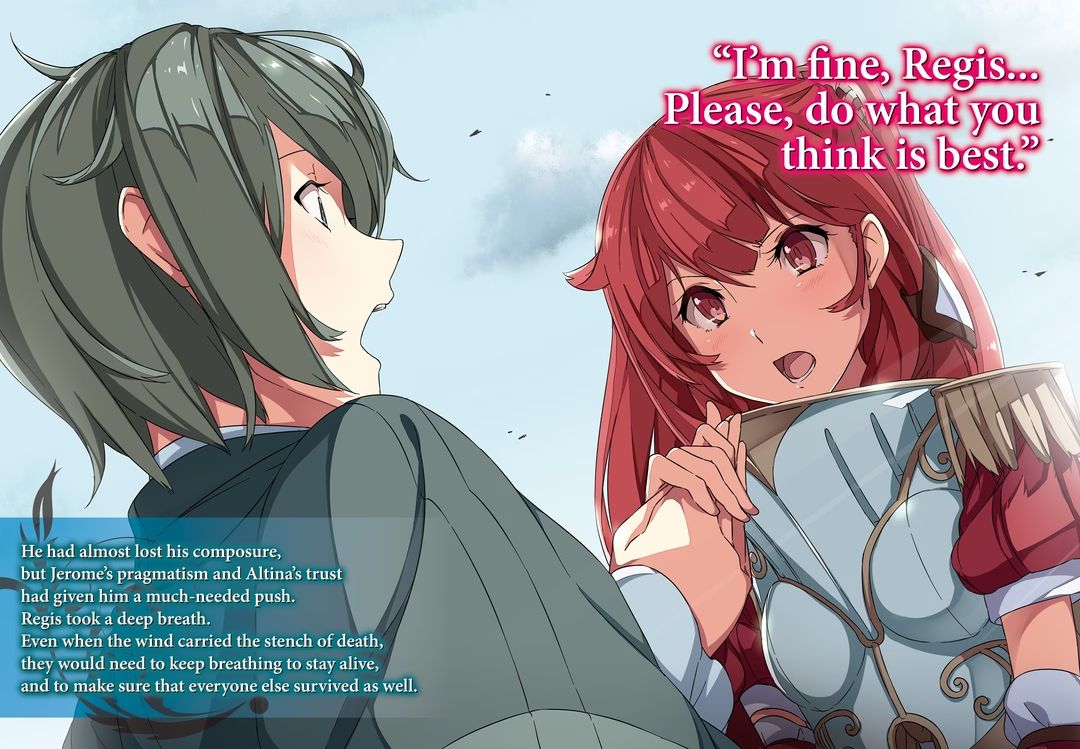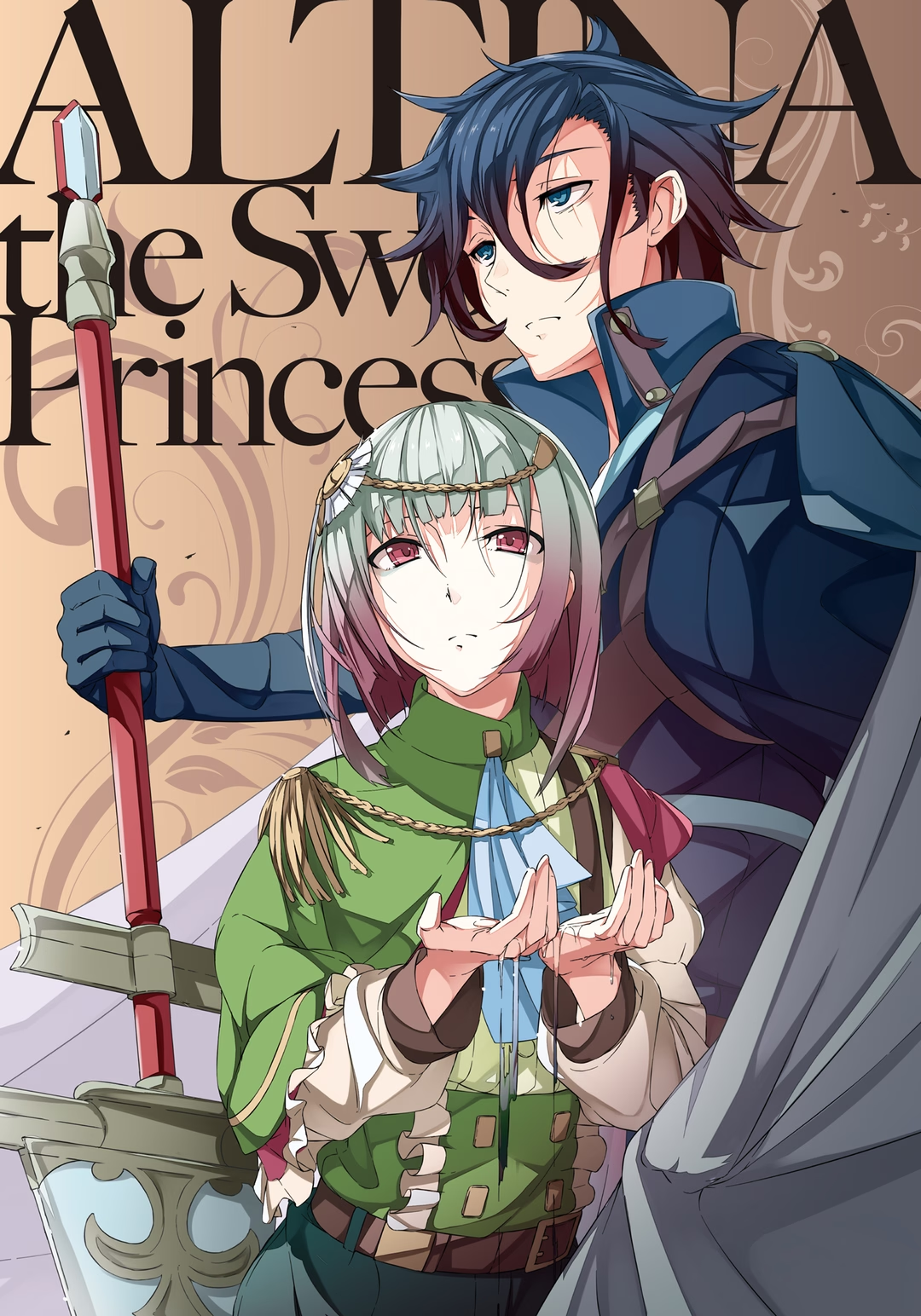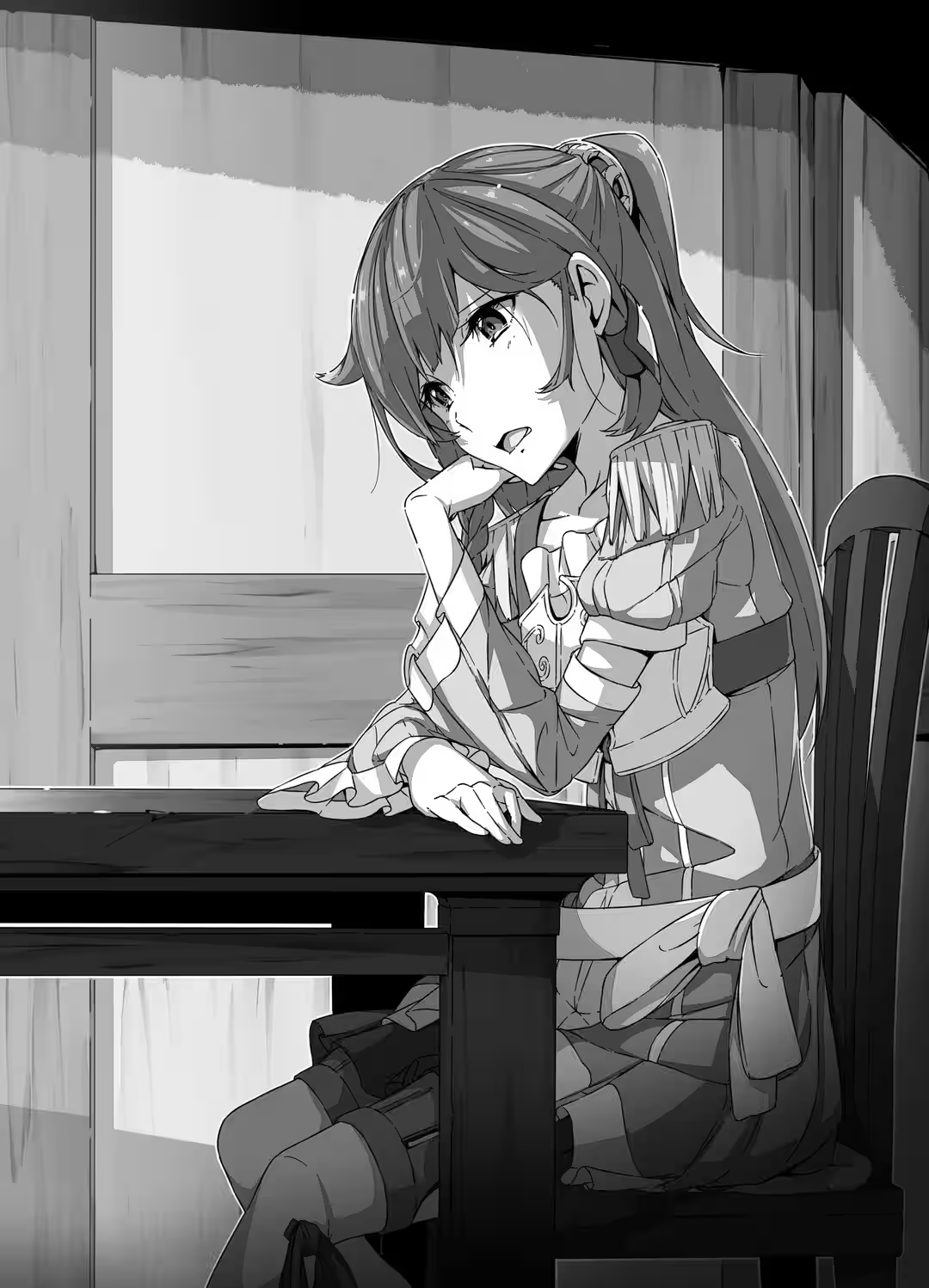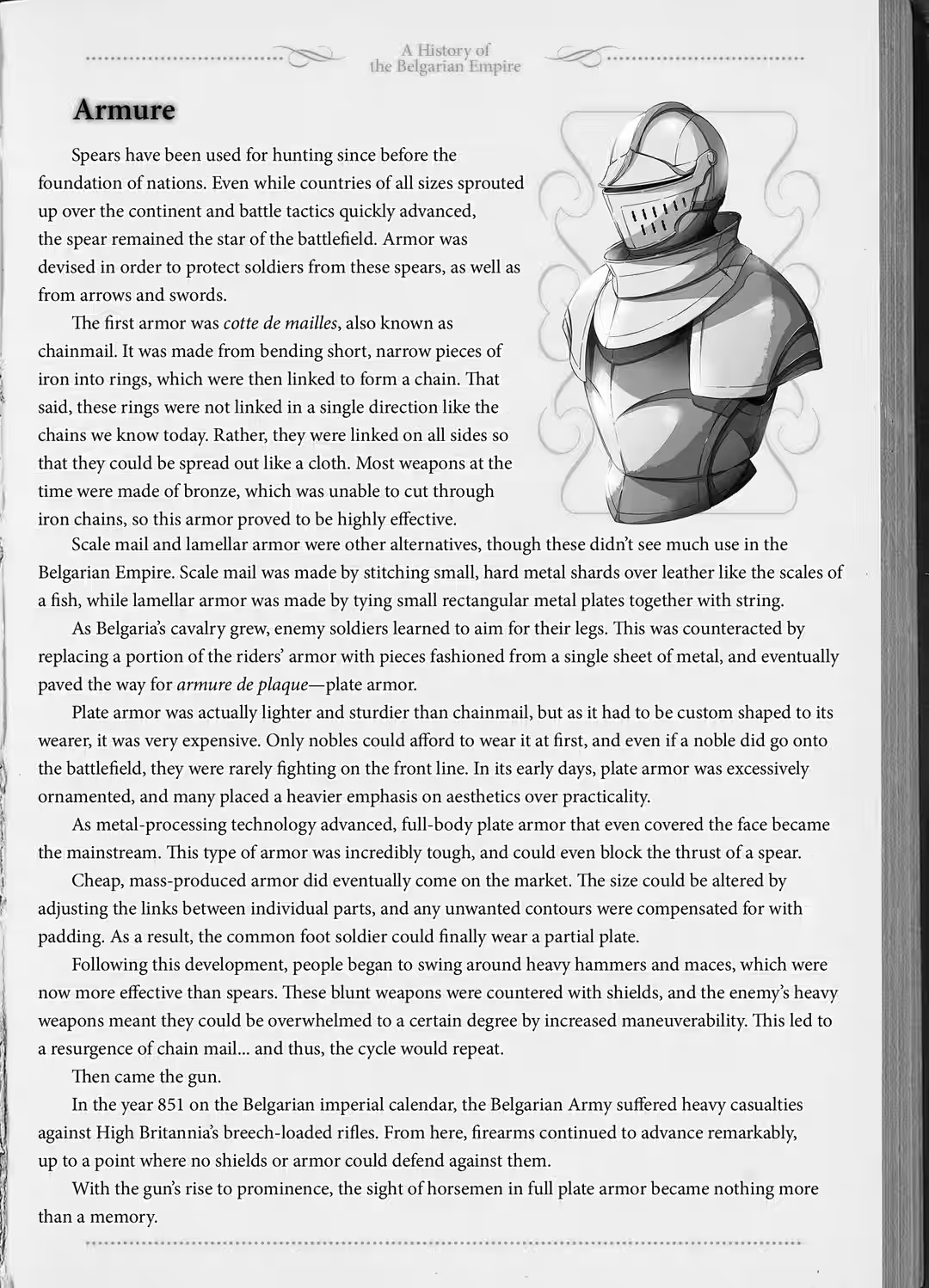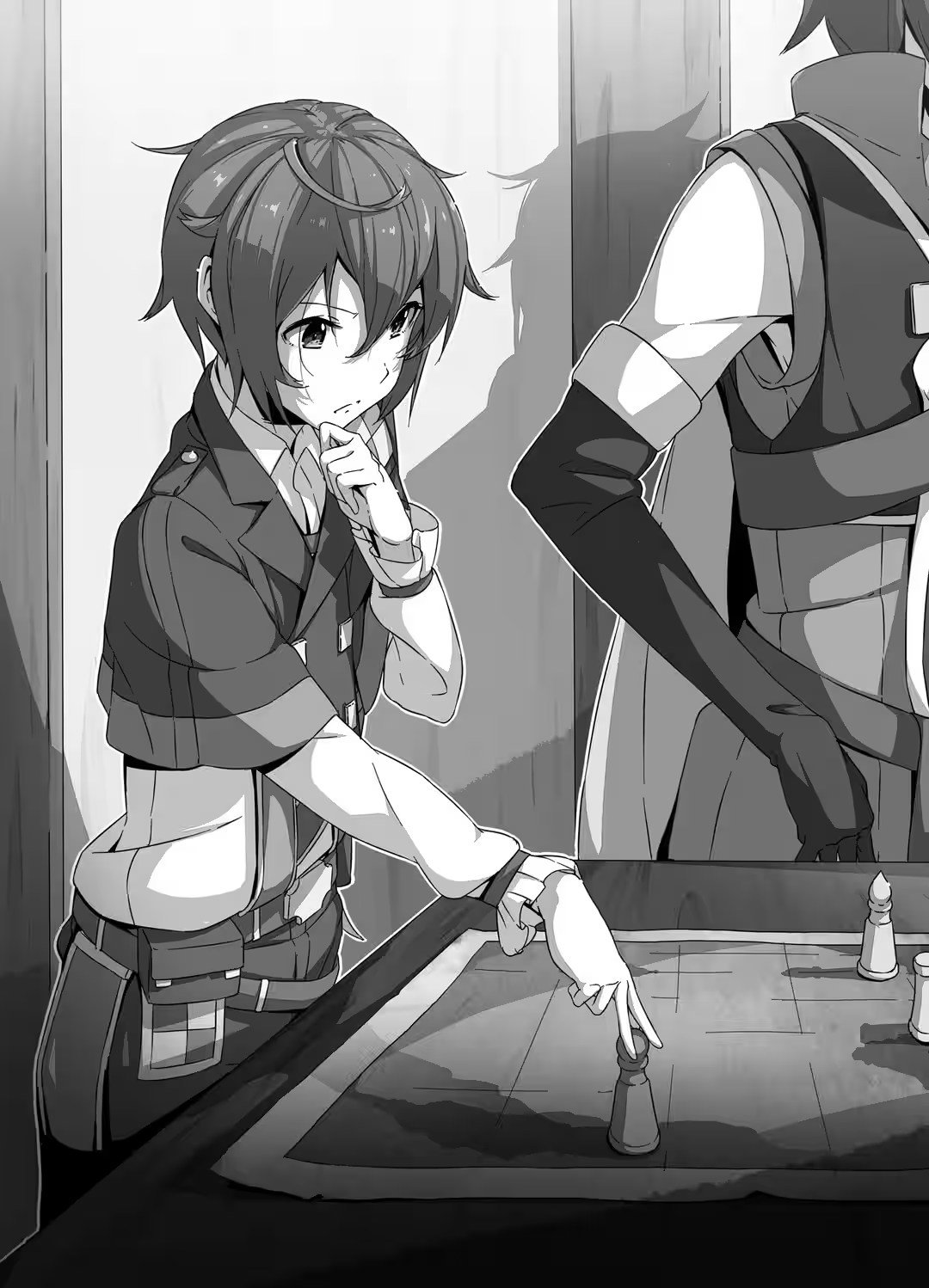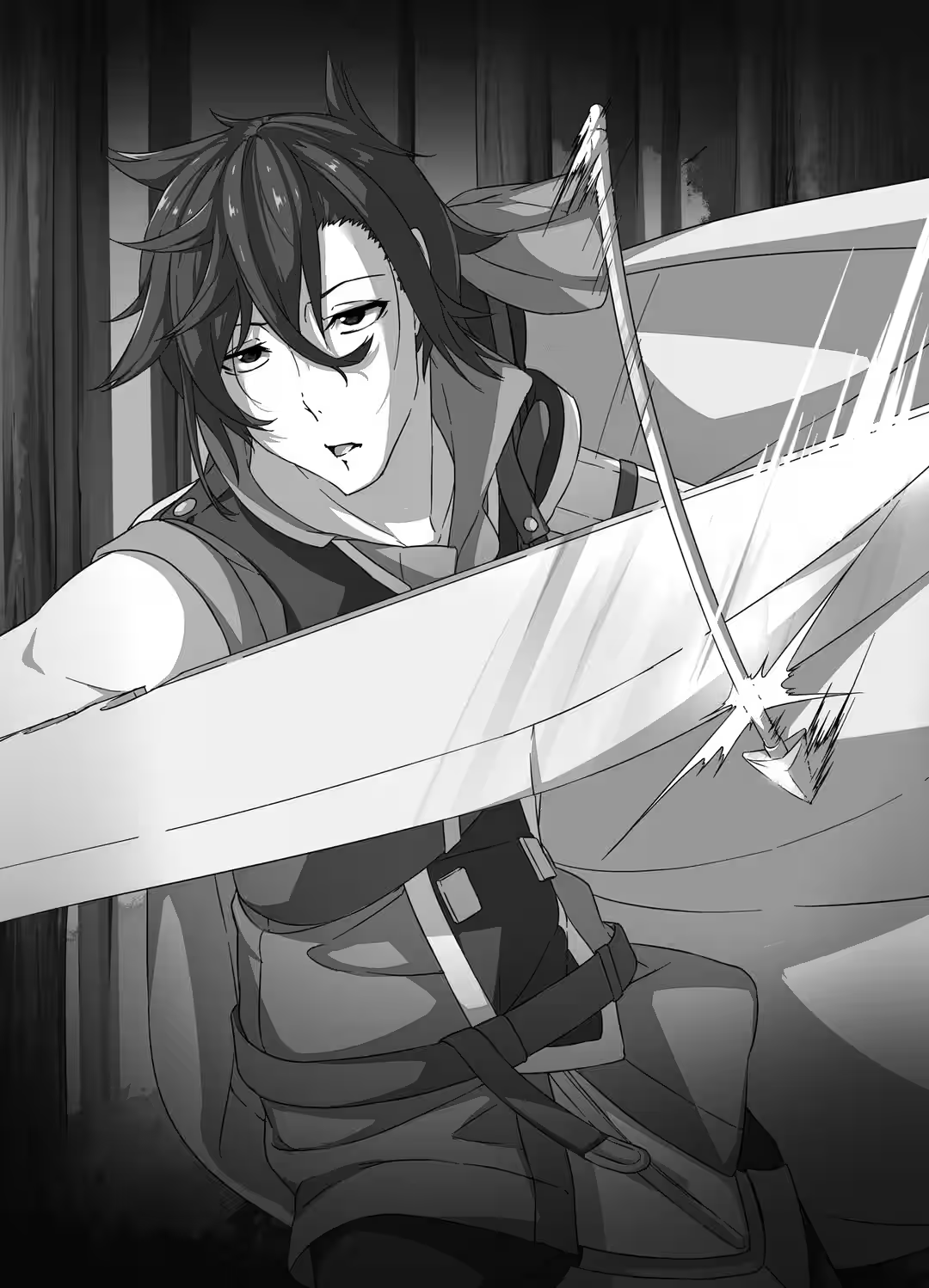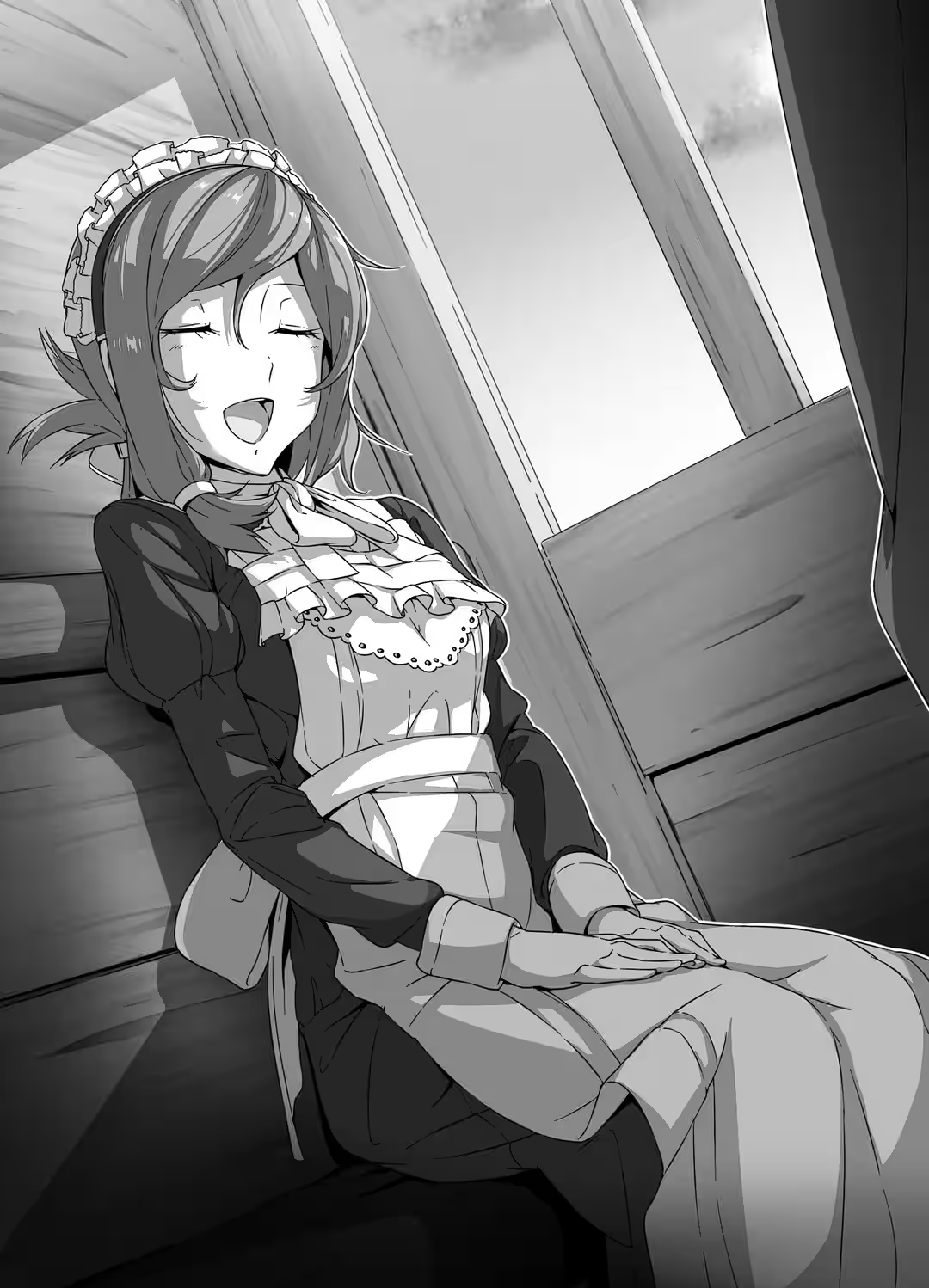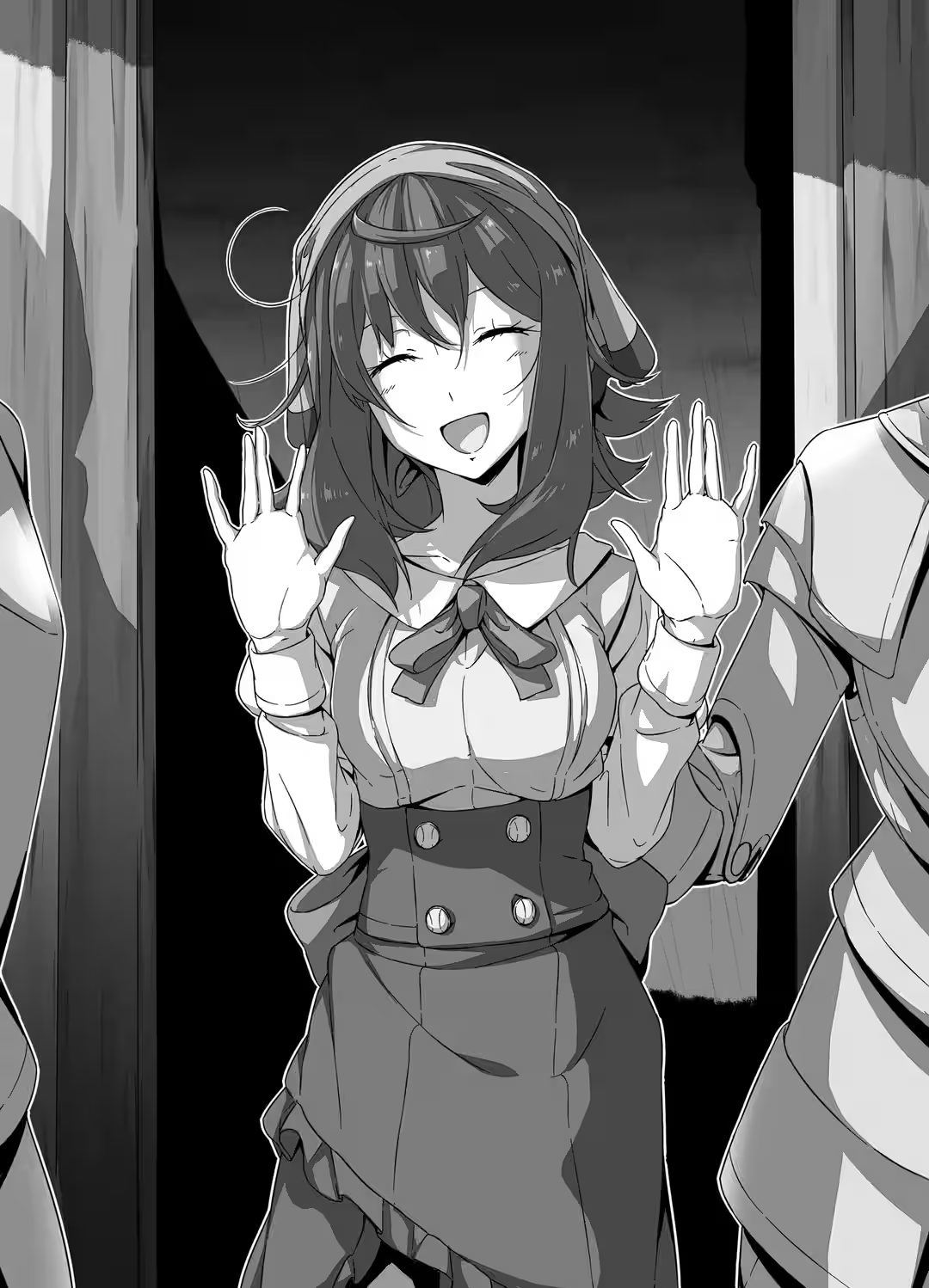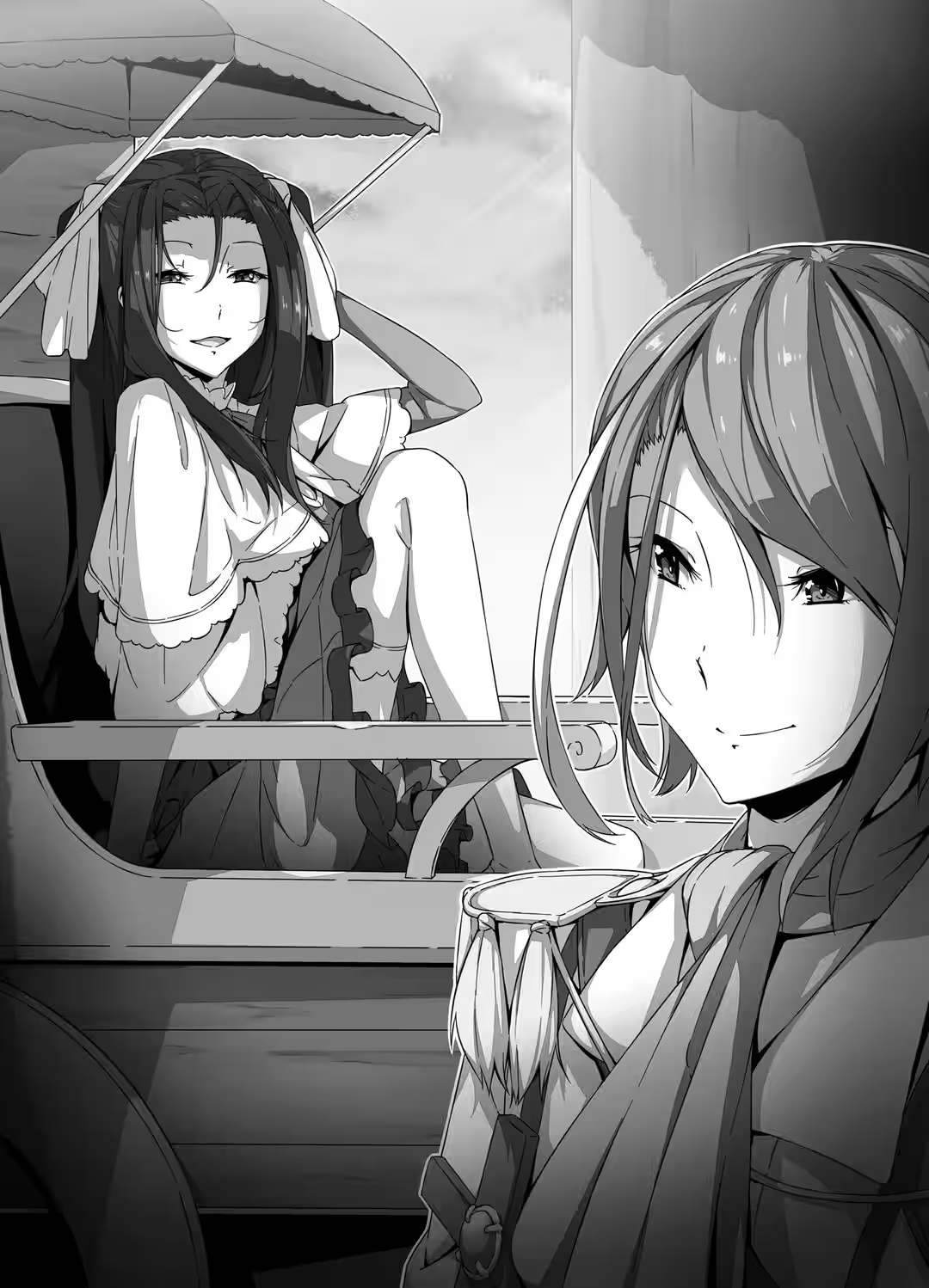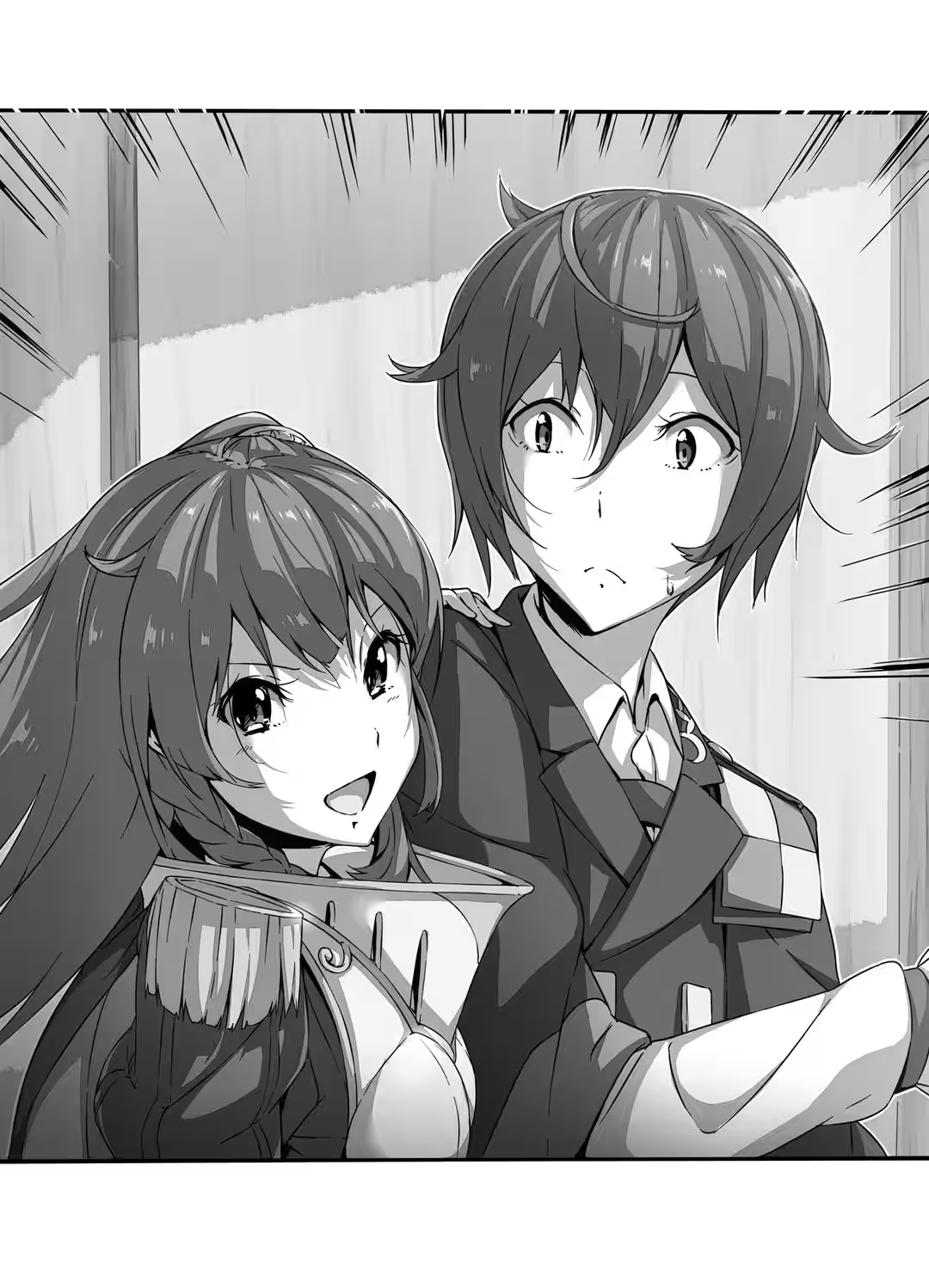Chapter 3: The Empire’s Seventh Army
The next day—
When midday had passed, the Empire’s Seventh Army finally appeared in Rouenne. They were an infantry-centered force, lacking a substantial cavalry and composed of stalwart men from the eastern war front—a line that was almost as intensely fought over as its northern counterpart.
The Seventh Army had Duke Barguesonne’s personal army at its core, which was five thousand strong. There were no mercenaries in their ranks—the majority were trained soldiers, while the rest were farmers conscripted from the territory who made up their light infantry. Whatever the case, they were all seasoned veterans; each and every soldier carried the air of a general.
The Beilschmidt border regiment had set up camp south of Rouenne, and these newcomers had now completely encircled them. As she watched this happen, Altina furrowed her brow.
“What’s their game? There’s open space to set up camp to the north, east, and west of town. Why have they come here?”
“They probably intend to intimidate us...”
Regis decided to say no more than that. Given their circumstances, there would be nothing more foolish than starting a fight between allies. Lieutenant General Barguesonne surely understood this as well. Making such a deliberate effort to agitate an allied unit was pointless—detrimental, even—so he must have had a good reason for his actions. The wisest response was to pay it no mind.
Altina, however, seemed unsettled.
“Shall we go and protest?”
“...There is no need for us to rise to every childish provocation. Worst-case scenario, they might turn our words against us and accuse us of overstepping our authority.”
“Ah, yeah. I can see that happening. Especially with that guy in charge.”
“I don’t know much about Lieutenant General Barguesonne’s character but, from what you’ve said, he sounds like someone I would rather not meet.”
“Oh? It’s rare to hear that there’s something you don’t know, Regis.”
“You can read critiques and biographies on the Empire’s nobles, but they’re all replete with flowery language, and so are useless as points of reference.”
“I’m sure it’s all exaggerated, too.”
“...If you take the stories circulating about our country’s nobles at face value, then our enemies are somehow still fighting despite their soldiers having been completely obliterated three times over.”
“How idiotic.”
As they were talking, a horseman galloped over waving the flag of the Seventh Army—a messenger, no doubt. The heavily armored knight reached the border regiment’s main camp in no time at all, but the imposing way in which he conducted himself suggested that he was no normal messenger. This man was in fact a noble and an officer.
He was an ally to be sure, but the Seventh Army’s pointless provocations had put the regiment’s soldiers on edge. They surrounded him, keeping their guard up as if dealing with an envoy of an enemy nation.
The messenger, however, seemed to pay it no mind. He dismounted from his horse and kneeled, then declared, “I come bearing orders from Lieutenant General Barguesonne!”
Barguesonne outranked Altina, so he did technically have the authority to issue orders to her. But their armies were separate entities, and it was common courtesy to first go through the proper procedures before taking someone else’s troops under your command.
Altina made no attempt to conceal the grimace seeping into her expression.
As much as I don’t want to stand out, I don’t want any trouble here, Regis thought as he stepped forward. “Let’s hear these orders.”
“A war council shall convene at once. Major General Belgaria, promptly make your way to the Seventh Army’s main camp.”
“Orders received. We will attend with all due haste,” Regis replied. ...And overlook your complete lack of consideration for us.
Regis’s general lack of self-respect meant that he wasn’t particularly fazed by the man’s pompous tone, but he couldn’t help but wonder why Barguesonne was going so far to assert his dominance. As far as he was concerned, power struggles between allies were like scuffles between stray dogs—so inconsequential that one couldn’t possibly be expected to take them seriously.
Regis produced a pocket watch from his uniform and checked the time. “We will be there by one o’clock. Please pass on the message.”
“Understood.” The messenger knight stood, then ran his eyes across troops around him. “I had wondered what manner of men supported the northern front and captured Fort Volks, but they seem remarkably unspectacular,” he scoffed.
Tensions immediately rose to such a degree that it seemed likely that weapons could be drawn at any moment. Knowing how prone to outbursts Altina was, Regis decided to act before she could.
This really isn’t my sort of role, but... “Was giving your opinion on our regiment a part of Lieutenant General Barguesonne’s orders?”
“...It was not.”
“Then please let the lieutenant general know that he would do well to avoid using messengers who can’t hold their tongues.”
Had Regis not said at least that much, it would have impacted troop morale. The messenger knight was evidently not so foolish as to ignore the warning; he gave an empty salute, then retreated in a huff as the soldiers around him cheered and sneered.
Altina sighed. “Thank you, Regis.”
“We traveled for two whole weeks only to get into an argument with our allies. It’s so pathetic that it almost brings tears to my eyes.”
“But had you not said that, I would have drawn my sword.”
“We’re going to meet the lieutenant general, so some self-control would be appreciated.”
“Who would’ve thought we’d come across such a formidable foe before we even engaged High Britannia?”
The fact that Altina wasn’t joking in the slightest brought a throbbing pain to Regis’s temple.
✧ ✧ ✧
“Welcome. We are much obliged,” Barguesonne said, not bothering to bow his head. He remained seated in a chair that had a rather large backrest, and while his words were courteous enough, his attitude made it clear that they weren’t welcome in the slightest.
He was a white-haired old man sporting a thick mustache, and the deep wrinkles creasing his brow made his stern expression seem even sterner. There was a sharp glint in his eyes, and his perfectly straight back told a tale of regular training—after all, the lieutenant general was a seasoned veteran who had been in the military since before Regis was born.
A chamberlain was standing by Barguesonne’s side, armed with a pike.
Altina touched her right hand to her chest in salute. “Lieutenant General Barguesonne, before I place my troops under your command, there is something that I must make clear.”
Regis was taken aback. What was she going to say? The impromptu announcement sent a shiver down his spine.
Altina and Regis were the only ones who had actually ventured into the Seventh Army’s main camp; the few guards who had accompanied them were waiting outside. Regis had wanted Jerome to come in the hope that his reputation would afford them some more leeway, but the man had refused, proclaiming that the summons was nothing but a pain.
The tent that they were currently standing in was much larger than the one being used by the border regiment. It served as more of an audience chamber than a conference room, with the lieutenant general seated all the way at the back. A large, empty space stretched between him and the entrance, on either side of which a number of senior officers were standing at attention. There were around thirty in total—too many for what should have been a simple meeting.
Altina stepped into the empty space and looked straight at Barguesonne, earning her cold glares from the surrounding officers. As much as Regis wanted to revoke her statement, it was impossible for him to do something so unseemly.
Despite the number of judging eyes upon her, Altina carried on, unperturbed. “Lieutenant General, I am aware that you do not recognize my authority. I am also aware that you are a part of Latrielle’s faction. Neither of these facts bother me. But should you issue an order in bad faith to purposely cripple the Beilschmidt border regiment during this battle—should you act to serve the interest of our enemy—it will be seen as treason toward the Belgarian Empire.”
She had spoken calmly, but her words were so brazen that they were sure to be struck from the record. Regis was so on edge that he was surprised he hadn’t started frothing at the mouth or collapsed; Altina hadn’t necessarily said anything wrong, but he had no idea how her opponent would respond. As a strategist, it was his job to predict how a foe would react ahead of time, but these sudden developments were bad for his health.
A brief moment passed, then Barguesonne opened his mouth to speak. “You are ten years too young to speak to me about the Empire. Now get in line.”
“...Yes, sir.” With a reluctant salute, Altina took her place beside the senior officers.
So he’s more than just a soldier... Regis mused. Barguesonne was older than them both, and that was something that Altina couldn’t change no matter what. As soon as he brought up his seniority, whatever argument they might have had was rendered moot. He hadn’t even acknowledged Altina’s demand for him to keep his personal and political biases separate from military matters, instead just clinging to her use of the word “Empire” to make it seem as though he had given a response.
Had they been of equal standing, she could have pointed out his attempt to dodge the matter, but as a lower-ranking officer arguing against her superior, the odds were not in her favor. This old man was clearly rather cunning.
An old-looking strategist stepped forward to give a report. “The High Britannian Army has occupied the port town of Ciennbourg in the territory of Duke Touranne. Thirty thousand men have already landed on our shores and have all but annihilated the Second Army on the western line. Thankfully, Lieutenant General Beaumarchais has survived. The enemy army has divided into three units, two of which are occupying forts and cities as they march deeper into imperial territory. We must vanquish these unjust invaders in the name of the emperor.”
“That’s right!” one officer called out from the line.
“Hear, hear!” cried another.
As much as Regis understood and respected that each army had its own practices, he couldn’t see himself getting used to the blatant appeal to emotion. At the very least, he would have liked them to clearly separate it from the factual report, not that there was much of one—the old strategist had already returned to his place in line without giving any extra details.
“Our chief strategist shall explain the rest. Second-Grade Admin Officer Vicente.”
“Sir!”
I guess they’re more particular about how their work is divided, Regis thought.
Once the general situation had been explained, someone else stepped forward. It was a young admin officer who had short hair and narrow eyes—a man who came off as more sickly than sharp. “I will hereby explain the details of this operation,” he said.
“...Hm?” Regis had thought that the name sounded familiar, but seeing the young man’s face made him even more certain.
“Is that the same Vicente from your time at the academy?” Altina quietly whispered in his ear.
“Probably...”
Vicente was the star cadet of another prestigious academy. Regis had only ever faced off against him once before, when he was representing his own school in a strategy match. He had never lost to anyone in his time at the academy, but it was against Vicente that he first experienced defeat. And while the circumstances were subject to criticism, a loss was a loss. Regis had never thought that they would reunite here, of all places. He was just happy to see that at least one of his old acquaintances was alive and well.
On Vicente’s order, a map of the area around the capital was brought in and displayed. Red pins had been used to indicate where the Seventh Army and the Beilschmidt border regiment were stationed—which was just outside of Rouenne—while blue ones were used to show the enemy army coming in from the west.
“According to our scouts, there are ten thousand High Britannian soldiers marching on our capital. We, the Seventh Army, number twenty-five thousand. The plains of war may differ from the eastern front we have grown accustomed to, but our guaranteed victory remains unshaken!”
Once again, the senior officers raised a spirited cry.
The report didn’t offer anything more than what Regis had already learned from his own regiment’s reconnaissance, so he couldn’t quite say that he understood the situation any better. Most importantly, his main concern had yet to be addressed: the reason why the enemy had chosen to divide themselves into three smaller units, each of which could be outnumbered by the Belgarian Army.
Concentrating one’s allies and dispersing your enemies make up the fundamentals of any strategy, so why would they deliberately divide themselves?
Regis thought back to the books he had read once upon a time. Publications on war and war-related tactics were so abundant in the Belgarian Empire that he wouldn’t doubt if someone said they were the best in the world. He made his regular pilgrimage through the massive bookshelves in his head, thumbing through innumerable pages as he went. Then, a single question came to mind:
“...Is the unit really only ten thousand strong?”
Regis’s murmur caused everyone around him to fall silent, as the officers who had been cheering just moments ago immediately closed their mouths. By the time he noticed it, a great many eyes were focused on him.
Now I’ve done it... He hadn’t intended to say that out loud.
Vicente’s glare pierced straight through him. “Do you have something to say, Fifth-Grade Admin Officer Regis Aurick? Feel free to speak your mind. You may be the lowest ranking officer here, but we take all opinions into consideration.”
Regis wasn’t great at speaking to crowds, but, as the Belgarian border regiment’s strategist, it was his duty to express any doubts he had. He had no choice but to continue.
“...I also received a report that the High Britannian Army had split into three units, but their reason for doing so remains unclear. It goes against all common sense. I have to wonder, is the unit marching toward us really only ten thousand strong?”
“Hm. You meant to say that you do not trust our army’s reconnaissance efforts?”
“...I am a coward, you see. I can never simply lay my worries to rest.”
“The enemy’s second division is due to meet with thirty thousand Belgarian soldiers, at the core of which stands the First Army. With General Latrielle leading the charge, our victory is certain. The remaining division stationed at the western port are presumably reserve forces.”
“...An entire third of their army are reserves?”
“Is it not reasonable for a country invading an unfamiliar land to prepare so many reserves? The High Britannian commander must be a cautious man.”
Vicente brought out a second map, this one extending all the way to the western coast. He placed it next to the first map, then stuck in three pins to represent the enemy’s forces. It was clear to see that the enemy was advancing east like a two-headed serpent, and that the imperial army was similarly splitting up to intercept them. Latrielle’s First Army was due to take on the northern head, while the Seventh Army would take on the southern one.
Each pin represented ten thousand soldiers, and the enemy only had one pin in each unit. The imperial army, on the other hand, had three pins in their northern unit, and another three lagging behind in various places as reserve forces.
In actuality, these reserve forces were simply the units who had been unable to join up with the main army. The reason for their delays varied; some had simply taken too long to prepare, while other, less enthusiastic units had deliberately fallen back to avoid depleting their forces. Whatever the case, those who were late would likely be subject to harsh criticism later on, and had the Beilschmidt border regiment not managed to push back Varden, they would have likely been among them.
Incidentally, while the Empire had invested one hundred thousand troops in this battle, they only had eight pins on the map. This was because the unit stationed on the western front, as well as the Second Army, had been completely wiped out, losing twenty thousand men in total.
Regis stared at the second map. “...Should the enemy’s northernmost division turn south and their rear unit move forward, then their forces might concentrate on our weaker southern side. In that case, our twenty-five thousand soldiers could be faced with thirty thousand enemy troops.”
That said, this figure also included each side’s logistics teams, so the number of soldiers actually fighting would be significantly lower.
“You haven’t changed in the slightest,” Vicente scoffed. “They ‘might’ target our southern side. We ‘could’ face thirty thousand troops. You always speak with such cowardly uncertainty. Need I remind you that the High Britannian Army is traveling through unfamiliar lands? It would be impossible for them to advance so quickly.”
It seemed that he remembered Regis as well. For a moment, their exchange during their past strategy match ran through Regis’s mind, but he had no time to steep in memories.
“...Is it really impossible, though? High Britannia is transporting soldiers and supplies via steamboat; even when fully loaded, it can make the round trip from their motherland in less than ten days. The invasion began on April 23rd, and it is already May 16th. Knowing that, should we not assume that they are better prepared than our intel would suggest? They could have transported their war horses over in that time, for instance.”
The distance from the occupied port of Ciennbourg to High Britannia was said to be roughly 150 lieue (666 km). A fully-loaded sailing boat could travel 30 lieue (133 km) in a day, and a steamboat was even faster than that—not to mention that the vessel would be empty on the return trip. Regis thought it dangerous to conclude that the High Britannian Army still consisted of no more than thirty thousand foot soldiers.
“The figure I gave you already takes the steamboat’s transport capabilities into account. Wasn’t that obvious?” Vicente’s tone as he replied was similar to a professor addressing an inept student.
“The last I heard, the Belgarian Empire had yet to obtain such details about High Britannia’s steamboats. Did we happen to come by this information recently?”
“The steamboat can accelerate without wind, but as the ship’s center must be occupied by its engine and an adequate amount of coal, its transportation capabilities are meager compared to what its size might suggest. This is something that we are all well aware of.”
The Belgarian Empire had been trying to create their own steamboat—namely one that was propelled by paddle wheels, which were attached on either side of the hull. It worked well on windless days, but also burned through an excessive amount of expensive coal and had a disappointing loading capacity, in part because the areas where one would usually store cargo were taken up by the engine and coal supply. It was subsequently determined to have no practical use. A screw propeller had been proposed as an alternative, but was almost instantly turned down; it required a hole to be kept open in the bottom of the ship to allow the rotating axis to turn, which was just asking for disaster.
“It has not yet garnered much interest in Belgaria, but... I read a dissertation that explained how they had managed to improve the propeller and maintain greater speeds while simultaneously downsizing the engine in recent years.”
While the propeller had originally been designed to mimic the action of manually rowing a boat, the latest version apparently focused on creating a current differential between both sides of the blade, which generated a lift that could be converted into propulsion.
It was said that this new design originated from an accident that had occurred during experimentation, in which the blades of a boat’s propeller came too close to the riverbed and snapped. Against all expectations, the shortened blades actually caused the boat to move faster. Up to that point, propeller blades had been long and narrow like oars, but it was now clear that shorter blades spun at much higher speeds and thus generated stronger thrust. The accident had happened a few years prior, but had only recently received a logical explanation.
This information had come in the form of a minor detail in a book that Regis had purchased and arranged to be shipped to Fort Volks during his trip to the capital in April. It was a laid-back romp set on the high seas, in which the protagonist was the leader of a pirate crew of young boys aboard a mighty sailing ship. Their enemy employed the top battleship equipped with the latest propeller, which the author described as the one “currently being implemented in High Britannia.”
I can’t imagine they’ll appreciate me citing a work of fiction, though, so I’ll just keep that part a secret.
“Hmph. In that case, I would love to hear you unveil whatever lofty plans are running through your head.”
This false praise only made it harder for Regis to answer, but he couldn’t falter here. For one, the slightest hesitation would damage not only his own reputation, but Altina’s as well. But, more importantly, the Empire’s current formation was rife with danger, and he had been given a rare chance to change that.
“I... propose that we send the Seventh Army north to join the First Army. We can then confront the enemy with a force of over fifty thousand.”
As the senior officers began to stir, Vicente’s lips curled into a smile. “So your plan is to make our certain victory even more certain. But if we go north to join the First Army, who will defend the capital?”
“The thirty thousand soldiers we have as reserve should be able to hold out for our return.”
“But our reserves have not yet arrived. By the time they do, the enemy will have progressed enough that the defense line will need to be set up quite close to the capital.”
“As long as they win, it shouldn’t matter where the defense line is.”
“Ah, I see. So it doesn’t matter where the battle takes place, so long as we’re victorious? Of course a commoner would believe something so erroneous. You completely fail to comprehend the true nature of war!”
“...Evidently.” Regis made no attempt to refute this, and Vicente continued into an eloquent speech.
“The Belgarian Empire must be overwhelming in its might! To allow our enemy to march right under the capital’s nose is a disgrace that should never come to be. Let alone, to permit the enemy’s invasion of the southern line we were entrusted to! What contempt you must hold for the dignity of the Seventh Army!”
The officers grunted in agreement.
You were the ones showing contempt... but I can’t really blame you for wanting to push ahead if you’re fighting for honor and glory. “...Very well, then. If we need to achieve victory on the southern line, then we should make sure we have the high ground. There are a few hills where we can set up formation.”
Vicente paused for a moment, then nodded. “That is something I’ve considered. Our enemy has no choice but to march across the vast expanses of the Empire’s territory. As their supply line grows increasingly long, they will be seeking a short and decisive battle. For this reason, I have no doubt that they will approach us even if they’re fighting at a disadvantage.”
“I’m sure the battle would be simple enough if all we needed to do was claim the high ground, but I can’t imagine it’ll be that easy this time...”
“Indeed. The High Britannian Army apparently has the latest guns and cannons, which means they could strike preemptively. However! Our force will be twice as large as theirs. We shall charge straight toward our foes, and trample them down before they even have a chance to use their artillery! What other manner of warfare could better suit the mighty Belgarian Empire!?”
“...That sounds reasonable enough.”
There was nothing strange or unreasonable about his plan—in fact, it was a well-known tactical maneuver. But this was precisely why the enemy was sure to see it coming. Why would they march ten thousand men to the capital, knowing that they would be drawn into a head-on battle against superior numbers? There had to be a reason. Did they believe that they could win despite their numerical disadvantage? Were they really that confident in the latest guns and cannons? Or could it be that they had some secret ploy to stack the odds in their favor?
We don’t have enough information, Regis thought. Scouts had been dispatched to observe the known units, but they had yet to report any notable developments. And while Regis had invested quite a bit into reconnaissance—especially given the increasing scope of the border regiment—he didn’t have nearly enough men to keep tabs on everything that was happening in the Empire.
What concerned him more than a lack of information, however, was the possibility of mistaken intel. It was no simple task to increase the number of scouts who could give accurate reports; theirs was a job that demanded courage, adaptability, discernment, reason, and loyalty, among a multitude of other attributes. What’s more, there was no prestige in their line of work. Despite their invaluable contributions, the stars of the battlefield would always be the cavalry and spearmen who led the first charge.
Seeing that Regis and Vicente’s conversation had come to a close, Lieutenant General Barguesonne raised a hand from his seat. Then, once the senior officers had stood at attention, he spoke.
“We will implement Second-Grade Admin Officer Vicente’s plan.”
From there, Barguesonne called the commanding officers of each battalion one by one and assigned them to their stations. They’re not going to put our regiment in the vanguard, are they? Regis worried.
Altina was the last person to be called.
“Major General Belgaria, your soldiers will be stationed in the rearguard. From there, you can observe what it truly means to fight a war.”
“Understood,” she said with a salute.
The surrounding officers suppressed the urge to laugh. From their point of view, this war was as good as won. The Belgarian Army was a force to be reckoned with, and they had twice the manpower of the enemy. High Britannia might have had the latest model of artillery and weapons forged of a newly discovered alloy, but the Seventh Army simply couldn’t imagine losing. They were so sure of victory, in fact, that they were treating the enemy like they were an assortment of cakes or fine meats at a banquet. Meanwhile, the outsider had been seated far away from the meal, where she wouldn’t even receive table scraps. But as far as Regis was concerned, there was no guarantee that the enemy would be the ones being served up on a silver platter.
Altina shot each line of officers a powerful glare. “While I have no intention of getting in your way, I won’t hesitate to step in if you’re about to lose, so you’d best not disgrace yourselves.”
“Hmph. That goes without saying. Don’t you worry—the Arrow-Sparrow Princess shall return north without a single merit to her name!” one man spat. On closer inspection, it appeared to be the messenger knight who had delivered their summons. He was, it seemed, the commanding officer of a battalion.
It had been quite some time since Regis had heard that defamatory nickname. The image it brought to mind caused him to remember her treasured sword, and he wondered whether his brother-in-law had managed to enter the imperial museum without issue. He was planning to go there this morning to look at the paintings and see what the sword originally looked like.
Despite already knowing that his efforts would be in vain, Regis raised his hand. “The enemy army must have some ulterior motive. I propose we strengthen our reconnaissance measures.”
“An ulterior motive? And what might that be?” Vicente replied, sounding thoroughly fed up. But Regis refused to back down.
“We don’t know, and that’s precisely why we should be more cautious.”
“Hmph. To think that a military strategist would admit to his own ignorance so readily...”
Well, it’s better—and less dangerous—than pretending to know... Not that the proper conduct of a strategist is something we should be discussing right now.
“In that case, Chief Strategist, have you determined the enemy army’s motive?”
Vicente returned a rapturous smile. “The High Britannian Army only invaded because they have developed new guns and cannons, so it stands to reason that their strategy will be heavily centered around them. Every type of weapon has a scenario in which it is most applicable; a cannon, for example, is especially effective against armies of a thousand men or more. Unfortunately for High Britannia, their soldiers hail from a small island nation, and are thus unaccustomed to battles against such large armies. When they come up against one hundred thousand imperial soldiers, they will cower and run away before they even have the chance to open fire. That’s why the enemy divided themselves into three separate divisions of ten thousand a piece—they hope to fully utilize the cannons they’re so proud of, while keeping each battle small enough that their soldiers won’t panic.”
He spoke so confidently and with such gravitas that Barguesonne and his officers immediately accepted his words, all wearing expressions of complete understanding.
“As expected of our chief strategist!” one man cried.
“That’s our tactician!” added another.
Regis opened his mouth to respond, but Vicente continued on. “Fifth-Grade Admin Officer Regis Aurick, should your cowardice infect our army, it will spread like a disease and lower troop morale. Please refrain from making any rash statements.”
“...Understood.” Having been cautioned by his superior, Regis had no choice but to comply. “You can rest assured that the Beilschmidt border regiment will remain on standby in the rearguard, taking the utmost care not to get in the way of our allies.”
The surrounding officers sneered, no doubt comparing him to an obedient new recruit.
Barguesonne gave a nod, and in no time at all, the Seventh Army’s strategy meeting switched to a conversation about what would be for dinner.
✧ ✧ ✧
Clunk!
Altina picked up a stone about the size of her fist, then punted it. A brief moment passed before it struck the ground with a dull thud. It had traveled so far that one would think she had used a catapult.
“...Are you testing out a new technique?” Regis asked.
“Gaaah! This is so irritating!”
They were making their way back from the Seventh Army’s camp. While both the Seventh Army and the Belgarian border regiment served under the Belgarian Army, the two were so far divided that not even an arrow would be able to cover the distance between them. The soldiers from the regiment who had accompanied them on the way there were following behind, but were far away enough that they wouldn’t hear what Altina was saying unless she really raised her voice.
Altina kicked a second stone. “What’s their problem!? If that was all the meeting was going to be, they might as well have just had their messenger tell us to stay in the rear. That would have been more than enough! What’s the point in bringing us all the way over there if you’re not even going to talk to us!?”
“...Yes, it feels like they didn’t acknowledge me at all.”
While Regis and Vicente had exchanged words, no real conversation had taken place. The Seventh Army had made up their minds before the discussion happened, and had likely only arranged the meeting so that they could dismiss whatever Altina or Regis had to say.
“They’re mocking us!” Altina exclaimed.
“I can’t say I disagree... The meeting was probably entirely for show. I imagine that they’ll say everyone was given a chance to speak, but that there were no worthwhile contributions. Maybe they just wanted to reassure themselves?”
“What does that even mean!?”
A meeting full of rejection and dismissal would not only waste time, but would chip away at the morale of everyone involved. Surely they knew that much.
“This would be the worst possible outcome for us if so, but... I have a sneaking suspicion that the Seventh Army were completely unaware that they were going into that meeting with the intention of rejecting us.”
“Huh?” Altina looked dumbfounded; how could they have been unaware when they had so openly dismissed everything that Regis and Altina had said?
“Those in a debate want nothing less than to concede to the other side’s point of view. To some, having to admit that they were wrong is almost painful. The notion that a discussion can result in someone quickly changing their mind as though they’ve suddenly woken up to an entirely new way of thinking is a complete fantasy. Instead, people cling to the same opinion, and do whatever they can to affirm it to themselves. Validation feels pretty good, after all.”
“I get where you’re coming from, but...”
“Let’s look at it another way. Say you decide to embrace an opinion that isn’t your own. By willingly obeying the beliefs of someone else, you’re denying your own thoughts. It’s an act akin to sealing away a part of your own mind, and nobody wants to do that.”
“You think so? But I quite like hearing what you have to say, Regis.”
“That’s when I’m answering your questions. It’s absolute bliss to have someone relieve you of a pressing doubt, but that’s not what I’m referring to. I’m talking about the pain that follows when you bring up something that you feel so strongly about, only for me to refute it. Take, for example, the time when I stood against your decision to become empress. Or when I opposed your desire to duel Sir Jerome. Or when you told me that you wanted to charge straight into Fort Volks, and—”
“Okay, okay! I get it!” Altina interjected, dismissively waving her hand. “It hurts just remembering it. There’s no need to keep going!”
“...Well, despite those exchanges, we can still hold a proper conversation.”
“Oh, you’re right. I wonder why.”
“The pain of rejecting one’s own beliefs comes from taking in the thoughts of someone else—an exchange of ideas, if you will. To successfully pull that off, you have to enter the conversation with respect, taking on the mindset that the other person is superior to you. At the very least, you would need to accept that the other person might be better than you in some regards. Once you believe that there’s something to be gained, you can proactively swap views, and only then can you bear the pain of rejecting your own opinions.”
Altina gazed at him in interest. Were these the eyes of someone who genuinely respected his opinions? Regis couldn’t help but feel a little embarrassed.
“Well said, Regis!”
“...Thank you.”
“So, in short, the reason that they’ll deny whatever we say is because they think so little of us!”
“That’s the gist of it. It isn’t just limited to conversation, though—the same goes for reading. If you start a book under the preconception that it’s full of nothing but worthless nonsense, then even the greatest works can seem mediocre. On the other hand, if you dive into a book with an open mind, then... Ah, that’s right... Yes, and then there’s—! Oh, and I couldn’t forget about—!”
“Um... What?”
“There are just so many amazing books in the world...” Regis said with a nostalgic sigh, quickly becoming lost in fond memories.
Altina sighed. “I know that my mother was a commoner and all... but that’s no reason for them to dismiss me right away...”
“Hm... I don’t think that’s the only reason they look down on you.”
“Really? Is it because I’m a woman, then? Or because I’m so young?”
These were also reasonable assumptions, but Regis believed that the crux of the matter lay elsewhere. “The Seventh Army probably look down on everyone but themselves.”
“How does that work? Does that mean they look down on Latrielle, too?”
“Someone like Latrielle would be considered a special case. They abide by a hierarchy of sorts, you see. These special cases are placed at the top—and are thus considered the most important—followed by the Seventh Army themselves, and then everybody else.”
Though strictly speaking, those in the Seventh Army weren’t all considered equal—there was most likely a separate hierarchy within their ranks, and perhaps even one for those who were considered outsiders. Altina didn’t seem to understand, as she simply cocked her head to the side.
“They value these ‘special cases’ more than military ranks and noble peerage?”
“Yes, but I have a feeling that these arrogant beliefs are subconscious. When a group sticks to the same members, there’s much less chance that they’ll encounter any meaningful opposition. Over time, they’ll continue to validate each other’s opinions, sometimes to the point where they’ll immediately deny anyone who they don’t consider an ally.”
“There’s nothing wrong with supporting your comrades, but why would they deny any outsiders?”
“Well, you’re disgusted by the Seventh Army right now, aren’t you? You think they’re wrong.”
“Of course!”
“Your comrades in the Beilschmidt border regiment will surely agree, and when they do, you’ll see them in an even more favorable light. ‘My comrades are such wonderful people,’ you might think.”
“...I might.”
“And then, when someone appears from who knows where to disparage the opinions of your comrades, how would you feel?”
“That’s... Ah!” Altina could be incredibly straightforward, but she was no fool; she realized that it was very easy for her to make the same mistake. “R-Right...” she said with a frown, “If an outsider came and rejected one of your opinions, for example, I might immediately turn against them.”
“That’s because we’ve built up a mutual sense of trust. But that’s no reason to automatically reject the person opposing me.”
“You’ve got a point... I trust and think highly of my allies in the regiment, but to disregard someone just because they disagree with my comrades is... Well, it’s just strange.”
“‘Strange’ is right; it’s important to separate an argument from the person giving it.”
“It is?”
“Well, it’s pretty common to believe an argument just because it’s come from a person you trust, which is a shame, really. It’s only a few steps away from authoritarianism, and should be rejected as a reason for siding with someone in an actual debate.”
“So we shouldn’t accept what someone says just because we trust them? But if you’re saying one thing and another person is saying something else, then it’s obvious which side I would lean toward.”
“That’s only human. But all opinions should be given equal consideration, and I want to become the sort of person who puts that into practice. It’s called illuminisme—the principles of the Enlightenment.”
“‘All opinions should be given equal consideration’... Even the opinions of an emperor and a commoner?”
“Yes, that’s right. There are a few books on the subject... There was even a renowned illuminisme scholar who tried to consider the opinions of a barking dog that had found its way into his house, but his assistants intervened.”
“Oh really... You won’t end up like that, right, Regis?” Altina asked worriedly. She was looking at him in the same way that one might look at a sick person, and frankly, he was a little offended.
Was that not a splendid anecdote...?
“Who knows? You might find more worth in a dog’s barks than my words.”
“Wait, that’s not the Enlightenment—that’s just your sister’s influence shining through again!”
✧ ✧ ✧
The evening of May 18th—
News had just come in that the ten thousand High Britannian soldiers marching north had suddenly turned south. Regis’s fears had been realized. But despite this, Vicente, the Seventh Army’s chief strategist, saw no reason to adjust their plan.
“We now see the enemy army’s true intentions, but their coordination is poor. They will not arrive before we engage the southern unit. Our victory remains unchanged.”
It was as he said—the enemy’s northern unit wasn’t expected to join their southern forces until two days’ time. And as the southern front was only half a day’s march from the Belgarian camps, the battle would probably begin as early as tomorrow.
Vicente went on. “We, the Seventh Army, shall crush the southern battalion tomorrow, on the 19th. On the 20th, we shall intercept the northern unit marching south. Meanwhile, General Latrielle’s First Army will be coming in from the north, allowing us to trap our foes in a pincer movement. And so, the High Britannian Army will be annihilated without question!”
Regis’s concerns were unending. “...Sure, if all goes well, this will be a picture-perfect divide and conquer. But would the enemy really march to their deaths so willingly?”
It seemed that High Britannia was playing straight into their hands, and nothing could have been more of a cause for alarm. Unfortunately, Regis and Altina had not been granted the authority to change the plans of the Seventh Army, let alone the imperial army as a whole.
The ten thousand soldiers occupying Ciennbourg showed no signs of movement. Belgarian scouts traveling by boat had recorded that the enemy had six battleships anchored off shore, but no transport ships—these were presumably making another return trip to High Britannia. An attempt had been made by the Belgarian Navy to destroy these transport ships, thus cutting off High Britannia’s supply chain, and what followed was known as the Battle of Touranne.
Belgaria had sent a fleet of twenty-four ships, the flagship of which was an Aeterna-class—a three-masted ship of the line about 120 cubits (53 m) across. Aeterna-classes were the pride of the Belgarian Navy; they had a three-layer gundeck, and eighty cannons spread across their castle-like broadside. Alongside these massive cannons, the ships also carried mortars that could fire explosive shells. These would detonate on impact, causing serious damage to enemy ships, but were unfortunately very inaccurate and relatively short-range.
Indeed, these large naval cannons boasted more firepower than any other weapon in the Empire. But even then, they were front-loaded smoothbore models that were terribly behind the times in comparison to the weapons being used by their enemy.
The High Britannian Royal Navy—commonly referred to as “the Queen’s Navy”—had beat its neighboring nations to the punch in loading their weapons with all sorts of new technologies. Their transport ships were guarded by six steam-powered Princess-classes, each of which sported seventy-four cannons. These were, for the most part, Type-41 Elswicks.
In terms of weapon range, output, and ship speed, High Britannia completely outclassed Belgaria .
On May 13th, the Belgarian Navy anticipated the route of a High Britannian transport ship. They lay in wait, then ambushed from the windward side.
The plan was close to perfect, but when pitted against the strongest warships in the world, the inferior imperial navy was forced to retreat without any significant strategic gains. The naval battle had ended in complete and utter failure.
Belgaria was already determined to send in their treasured Poseidon-class, 120-cannon ship of the line, but it would be quite some time before it could be deployed on the war front; this particular class of ship moved so slowly that it was mockingly referred to as a floating fortress.
For the time being, it was a pipe dream to expect any support from the coast.
✧ ✧ ✧
Imperial Year 851, May 19th—
The sky was dark and cloudy; it looked as though it could rain at any moment. Twenty-two thousand Belgarian soldiers stood in formation atop a hill in the upland region of La Frenge. Their logistics team had already retreated to the back line.
A unit of imperial foot soldiers would usually be led by a line of musketeers, but as the weapons being used by High Britannia were so vastly superior, there was little point here. The musketeers would simply be asking to be shot, and would only get in the way of the army’s charge.
There was no chance that a unit of regular foot soldiers would come out victorious—in fact, this was thought to be why the Second Army had been defeated in the first engagement in Ciennbourg. That was precisely why, in this battle, they had stationed shock troops armed with long spears in the vanguard. The soldiers were spread out in orderly lines like a rectangular carpet draped over the hill.
Afternoon came.
Below them, around 50 arpents (3574 m) away, was High Britannia’s army of ten thousand. Their front line consisted of soldiers equipped with their latest firearm—the Snider. This make of rifle was weatherproof, and truly excelled when it came to consecutive fire; it was said that it could fire thrice in the time it would take an imperial soldier to reload.
Behind this front line stood troops armed with large shields. It was usually standard practice to station spearmen there in preparation for close-quarters combat, but... behind this wall of shields were the cannoneers, manning what appeared to be around two hundred cannons. These were probably Type-41 Elswicks. By establishing a sturdy rampart protecting a line of cannons, High Britannia practically had a fortress creeping along the ground.
The Battle of Ciennbourg had made it clear that the Type-41s had a range of around 45 arpents (3216 m), so they wouldn’t be able to reach the Belgarian Army from where they currently were. And given that their foe was above them, they would need to be even closer than they would on flat land.
For the Belgarian Army, this height advantage gave their cannons greater range than usual. But, unfortunately, the mid-sized cannons brought by the Seventh Army only had a range of 28 arpents (2000 m); the Type-41s would likely reach them first, even from the bottom of the hill.
As for the Beilschmidt border regiment, they were stationed quite a way behind the Seventh Army, and totaled three thousand excluding the logistics team and the rearguard. While the main camp was also usually set up closer to the rearguard, it had deliberately been moved to the vanguard in this battle.
Altina was clad in heavy armor for once, while Regis wore the same uniform as usual. They were joined by an armor-clad Jerome as well.
“Hmph. Cannons that can’t even reach the enemy are only gonna get in the way. Why’d they even bring them?”
“The Seventh Army’s strategist likes to play by the book.”
Unfortunately, that book didn’t say anything about what to do when the enemy brought cannons that performed several tiers above one’s own.
“A book? Surely that’s right up your alley, then,” Jerome snarked.
“Yes, well... while I do enjoy reading textbooks, I won’t use the tactics detailed in them.”
“Oh?”
“The way I see it, in regard to both offense and defense, the most important thing is to make sure that your enemy can’t discern what you intend to do. Not only is it scary not knowing what your foe’s next move is, but it makes counteracting them especially hard.”
“My thoughts exactly.”
“What’s written in the textbook is probably reasonable, but... just the fact that it breeds predictability makes following it a poor move.”
“Pff...” A rare, amused smile crossed Jerome’s face.
Come to think of it, I think I’m getting more chances to discuss strategy with Jerome... Their discussions hadn’t been limited to specific plans, either—they had gotten to talking about some more abstract concepts, too.
“Ah!” Altina raised her voice. “They’re moving!”
“So it begins...” Regis said with a nod, glancing toward the front line.
As the High Britannian Army slowly closed the distance, the Seventh Army commenced its march to meet them. Their main force consisted of nineteen thousand, but they did not rush the enemy. Instead, they proceeded at a brisk walking pace.
“Aren’t they going to get shot doing that?” Altina asked, cocking her head to the side.
“They are, but there isn’t much they can do about that... Even when going downhill, the furthest a soldier can reasonably sprint is around 5 arpents (357 m). Sure, this doesn’t seem like a time for a leisurely stroll, but they’ll tire out otherwise. They have to save their charge for when they’re within shooting range. Otherwise, the casualties will be greater than anything the cannons can do to them.”
“I see!”
Oh, right... This is probably the first time that Altina’s witnessed two large armies colliding on an open plain.
As the Beilschmidt border regiment strongly utilized the Black Knight Brigade led by the hero Jerome, they employed tactics centered around cavalry, and their numbers weren’t close to anything that could be considered a large army.
“Get a good eyeful, Altina—the Seventh Army supposedly uses their infantry better than any other army in the Empire.”
“Barguesonne did say that I should get a look at what it truly means to fight a war...”
“...Let’s hope that looking is all we have to do.”
The backs of the Seventh Army grew more and more distant as they continued to advance.
“Do you think they’ll win?” Altina asked.
“If the two armies collide head-on, then yes. Even if High Britannia’s guns and cannons manage to cut our numbers in half—even if the enemy’s weapons are made of a new alloy—I don’t think the highly-trained Seventh Army will lose. However...”
“However?”
“High Britannia’s commander should know that, too. There’s no way he came without a plan.”
At the moment, things were going exactly as Vicente had predicted—the Seventh Army would crush the enemy in direct combat, pincer the forces marching down from the north, and then celebrate a massive victory. Assuming that happened, Regis—as someone who had continuously voiced his doubts—would be labeled a coward, and that would be that.
But the port was assaulted concurrently with the new queen’s coronation. Plus, it was hard to believe that an enemy commander who was thorough enough to also instigate an attack by Belgaria’s other neighboring nations to delay the Empire’s response would do something as drastic as give up his own battlefront.
Once again, Altina tilted her head. “Is there another enemy hiding?”
“I doubt there’ll be an ambush. The Seventh Army probably scouted quite thoroughly, and I know they didn’t let up on their intelligence efforts. Speaking of intelligence...” Regis decided to change the topic. “We’ve figured out who the commander of High Britannia’s southern unit is. His name’s Oswald Coulthard, apparently. He holds the rank of colonel, which would put him on the level of a first-grade combat officer in the Empire. It’s not too high of a position, and he’s still rather young, but it seems their leaders are still moving under his orders.”
“Doesn’t that mean he’s a tactician, then?”
“Sure, anyone can propose a plan regardless of rank. Take me, for instance. But this Oswald fellow seems to be giving the actual orders—based on what our reports say, at least.”
“And if he’s the one giving the orders, that makes him the commander.”
“Right. Though, on paper, their commander is an elderly gentleman who holds the rank of general.”
Even though Oswald had taken charge, he was apparently just a staff officer.
“I don’t get it... How does that work? Is he a high noble or something?”
Military rank was distinctly separated from noble peerage, and the military had its own rigid chain of command—at least, that was how it was supposed to be. In reality, the line between the two could get somewhat muddled. There were times where peerage proved far more important than rank, which was especially the case in Belgaria, where nobles could maintain their own armies.
High Britannia did not allow nobles to have their own personal armies, and Regis hadn’t heard of any cases where someone had been granted command privileges based on pedigree. The reason Oswald carried himself like a commander remained unknown.
“His lineage is still under investigation, and, while this information is highly suspect... there are rumors that he is accompanied by the new queen, Margaret Stillart.”
“What!?”
“In Belgaria, the emperor may go out onto the front line so long as he’s in good health. But High Britannia has been ruled by queens for generations, so that kind of thing is considerably rare there...”
“If what you’re saying is true, then she must be quite the proactive woman. I kinda want to meet her.”
“Yes, preferably in more peaceful times...”
“How skilled do you think she is with a sword?” Altina asked eagerly. Perhaps she was feeling some degree of kinship to the High Britannian queen, as she really seemed to be looking forward to their potential encounter.
Regis gave a wry smile. “...I don’t think she’s that sort of woman.”
Belgaria’s royal family was special; Regis hadn’t heard anything about the High Britannian royal lineage possessing any superhuman abilities.
“Another interesting thing to note is that High Britannia’s southern unit seems to consist entirely of their standing army, while their northern unit marching south is mainly composed of mercenaries. It’s standard practice to keep the standing army at the core of any unit and then hire mercenaries to reinforce their ranks, but I think they’ve kept the two separate for a reason...”
“What reason would that be?”
“A unit made entirely of soldiers from the standing army can be expected to have higher morale and better coordination. Mercenaries, on the other hand, rely more on individual strength. Hm... Perhaps this lack of coordination is why it took their northern unit so long to march south... Ah, but... No, that can’t be true.”
“Why not?”
“They may be a full unit of mercenaries, but word is that their commander is Mercenary King Gilbert Schweinzeberg.”
The name alone caused Altina to knit her brow in an unpleasant scowl. She must have remembered when Eric was shot, and her sword broken. “Weren’t they Germanian?”
“They’re mercenaries, so anybody can hire them as long as they’re willing to pay the right amount. According to our report, the mercenary brigade Renard Pendu makes up the core of the northern unit. Gilbert is far more accomplished than your average commander, so there’s no chance that he’d make such an amateurish mistake.”
“But the whole unit can’t consist of their mercenaries, right?”
“You have a point. I don’t have any exact figures, but I’d estimate that Renard Pendu only makes up around a thousand of their troops. The remaining nine thousand are probably mercenaries hired from elsewhere.”
“They don’t sound like the type who would obey orders.”
Even with Gilbert leading them, there was no telling whether the other mercenaries that High Britannia had scraped together would listen to him.
“...In that case, I’m sure the southern unit would have marched north to meet them instead. Their men are well disciplined and it would be easy to calculate their movement speed, so that would have been the more appropriate measure.”
“Haven’t they messed up, then?”
“...They’ve deployed thirty thousand troops; I can’t imagine they’d make such a rookie mistake.”
“But their units didn’t meet up in time.”
“That’s correct.”
The battle was already underway. Cannons roared to life as they started their bombardment, the very air seeming to tremble under their ferocious might.
It was a one-sided offensive—it had to be. The enemy could begin their bombardment from 40 arpents (2858 m) away, and it would take the Seventh Army twenty minutes to span this distance. As they made their advance, the troops could do nothing but accept the oncoming onslaught, during which countless men would be shot, injured, and killed. For this reason, foot soldiers had come to know this maneuver as the marché de la mort—the death march.
Cannonballs from High Britannia’s Type-41 Elswicks tore through their ranks. They were lumps of solid iron, each one roughly as big as the skull of a child, and one direct hit was enough to kill a soldier instantly.
It was a gruesome sight; scattered limbs and remnants of armor from those who had been struck littered the battlefield, while those who pushed onward were assailed by the devastating blast waves as shells continued to fall around them. This was an era when infantry soldiers marched shoulder to shoulder with their spears, stepping in perfect unison as they continued forward like a wall.
Belgaria’s main concern was losing too many men in the advance; the last thing they wanted was each soldier having to take on two, or even three combatants by themselves when they reached the enemy’s tight-knit formation. To prevent this from happening, the marching troops had to ensure that there were no gaps in their ranks, even while High Britannia’s cannonballs—shells that could shatter even a castle’s ramparts—rained down upon them.
But physical injury wasn’t the only danger—the deafening booms of cannon fire, the agonized screams of their allies, and the fear of impending death all chipped away at the soldiers’ spirits. Some cowered and froze in fear, while others tried speeding up so that they could begin the charge sooner. The only thing that kept the crumbling formation firmly held together was the strong encouragement of the commanding officers placed at key points along the advancing line. Their unyielding discipline truly was admirable.
The Seventh Army was used to taking on small nations like the Kingdom of Estaburg, and while they were not easy battles by any means, those enemies were not armed with the latest cannons. The marching soldiers were faced with an unknown threat, but even so, they continued pushing forward.
The distance between the two armies shortened second by second, and eventually Belgaria started to fire back. Despite the bombardment, High Britannia held their position, unmoving. They weren’t showing their backs, making it clear that they weren’t going to retreat, but they had halted their advance. They were probably buying time before the northern unit arrived.
Belgaria’s soldiers continued to advance. 25 arpents (1787 m) remained between them. The Seventh Army had suffered casualties that were devastating beyond words; it was like they were marching on an impenetrable fortress. It was impossible to fire accurately at such a distance, even when using the newest cannons, but the blast waves alone were enough to cause heavy damage.
Soldiers praying for God’s salvation suddenly found themselves on His doorstep, and captains barking out orders to continue the advance were instantaneously blown into pieces. The limbs and entrails of allied soldiers flew through the air, and those who lost their nerves and collapsed perished as they were trampled by the troops marching behind them. But even as they stepped over their comrades’ corpses, the Belgarian Army continued pressing on through the rain of cannon fire.
✧ ✧ ✧
As her regiment advanced to fill the gaps left by the Seventh Army’s absence, Altina looked over the enduring battle from atop the hill. “Urp...” She clapped a hand over her mouth, her eyes tearing up as she desperately tried to contain her nausea. The action was happening far away enough that it would be hard to make out any details, but, to Altina’s misfortune, her eyesight was much greater than that of any ordinary person.
Regis also swallowed down his urge to throw up; they couldn’t show too much weakness in front of the troops as they needed to maintain Altina’s noble, dignified appearance.
“...This isn’t your first time witnessing death, is it?”
“I... I’ve just never seen anything quite this horrible...”
“Yeah. Me neither.”
“Are you okay, Regis?”
“...Do I look okay?”
Regis had always deliberately tried to hide any unrest that he was feeling, but whenever he came out onto the battlefield, he would always be beset by uncontrollable shivers. Even in cases where one side wasn’t using the latest cannons, the front line was always abound with tragic sights aplenty—sights that would make anybody scream if they witnessed them in the middle of a town. The very prospect that people were dying was enough to make his mouth go dry, and a simple change of setting didn’t immediately make it all right.
No matter who it came to, death was terrifying; it was a devastating, irreversible loss. With each explosive impact, it seemed as though more and more blood was mixing into the air. Regis could feel a new death enter his body with each breath he took, making him reluctant to even breathe at all.
“Hah!” Jerome exclaimed, scattering the morose air. “Quit getting into a rut over every little thing! Be it now or later, here or there, a human’s eventually going to croak! It’s only a matter of when.”
“I know you’re right, but—”
“If you let yourself get caught up thinking about such nonsense, you’ll much sooner be joining them on the other side!”
“...Right.” Regis shook his head. He couldn’t allow himself to be swallowed up by the atmosphere of war. As the border regiment’s strategist, a single lapse of judgment could lead to a great many soldiers, officers, or even Altina herself joining the ranks of the dead.
He had to start thinking straight. His hands trembled out of nervousness and fear, and it was then that Altina reached out and firmly gripped his fingers.
“Regis...”
“Yes? U-Um... Altina...?”
While their guards were some distance away and wouldn’t be able to hear their conversation, they would at least be able to make out what was going on. Regis didn’t know what to say about her grabbing his hand so suddenly.
Yes, certain rumors could have an impact on troop morale... Regis thought as he watched her serious gaze. ...She really is quite beautiful, though. And her hand is so warm.
“I’m fine, Regis... Please, do what you think is best.”
“...Understood.”
He had almost lost his composure, but Jerome’s pragmatism and Altina’s trust had given him a much-needed push. Regis took a deep breath. Even when the wind carried the stench of death, they would need to keep breathing to stay alive, and to make sure that everyone else survived as well. To this end, he made a deliberate effort to harden his heart.
“The High Britannian Army is plotting something... I just know it. At this rate, we’re going to lose,” Regis said. Now more than ever, he needed to figure out their plan and act accordingly. He looked out across the battlefield once more, this time doing his best to drive the idea of soldiers losing their lives from his mind.
Keep your feelings under control. Imagine you’re looking at a chess board. Think calmly.
As the Seventh Army descended the hill, the square carpet that was their formation had gradually been eaten away by moths. They numbered perhaps sixteen thousand now.
Meanwhile, the High Britannian Army was arranged in a wide semicircle. Their frontmost line was composed of riflemen, behind which was a line of shield bearers. They were gradually moving their cannons back, replacing them with another line of riflemen each time, but as these cannons had such excellent range, the bombardment continued almost uninterrupted.
There had to be a reason for this behavior. Their main camp was likely at the center of their formation—the place most guarded by soldiers in heavy armor.
Regis searched the library in his mind, flipping through page after page... but unfortunately, none of the books he had read contained tactics that accounted for such advanced cannons and guns.
“No, but... This formation... I’ve seen it before... But where...?”
Altina continued to grip Regis’s hand as he mumbled to himself, while Jerome simply waited in silence. Regis was seeking a book that would explain all of the enemy’s actions thus far, but again, these new forms of artillery hadn’t appeared in any of the stories he had read.
Is there really nothing I can do? I don’t know of any tactics that could be used against weapons no one has ever seen before, and I’m useless when I don’t have knowledge to fall back on.
“Where? Where? ...Ah! O-Of course! It’s magic!”
“Uh... Regis?”
Regis suddenly turned to Altina, whose eyes were open wide in surprise, and declared in all seriousness: “It all makes sense! I Am the Legendary Wizard!”
“Wh-What are you saying, Regis!? Is your head on backwards!?”
“Ah, no, that’s the title—I Am the Legendary Wizard by Orenburke. He’s an author known for the vast, fantastical worlds he creates, and the army of a magic state from one of his works fought just like this.”
“Y-Yeah?” Altina cocked her head, rather concerned that Regis was suddenly talking about magic. Jerome, meanwhile, was looking at him as though he was a walking heap of garbage.
“Oi, Regis! Is that ‘magic’ stuff going to be of any use in battle? I’m open to anything as long as it’s got some value, but useless trash goes straight in the fire!”
“Yes, of course it’s going to be of use. The particulars may differ, but the key events are the same. In which case, we’re short on time. I’ll explain on the way. Ah, but we had our carriage retreat along with the logistics team...”
Regis had entrusted the luxury carriage he had been gifted to the transporters, who were also taking care of Clarisse. He wasn’t very confident about his stamina, but as he couldn’t ride a horse, Regis would have to march with the infantry soldiers and explain the plan to Altina and Jerome as they rode beside him on horseback. He wasn’t carrying a heavy weapon or wearing any heavy armor that would tire him out, so he was sure that he could manage it... Well, he was hopeful, at least.
“You can ride on Caracarla, then,” Altina suggested, bringing her horse close.
“Is that what you named her?”
“Yep! Isn’t it cute?”
“Sure... But isn’t it a bad idea to have me ride with you...?” Regis asked hesitantly. But for once, Jerome fully supported Altina’s idea.
“Off you go! The princess doesn’t have her famous sword, and when she’s wielding a weapon she’s not used to, she’ll only be a hindrance on the front line. Take Regis, and stay in the rear!”
I really hope this doesn’t lead to any rumors... Regis thought, before nodding in compliance.
“Grr... You’re in cahoots, the lot of you,” Altina grumbled. “Everyone keeps telling me to stay back and watch.”
Had Altina been permitted to act as she pleased, Regis could definitely see her charging to the front line.
“Well, I’m all yours, Altina. I’ll explain the plan along the way.”
“Great!”
“Oi, Regis! You want the troops to advance, yeah!?”
“That’s right. Just down to the center of the hill, staying out of cannon range. Once there, we’ll take a detour. It’ll be another five minutes or so before we know whether we’ll need to move left or right, so for now, just march forward.”
“Five minutes? Tsk, you and your nonsense...” But despite his complaints, Jerome leapt onto his trusted steed, raising his cavalry lance Les Cheveux d’une Dame up into the air. “Alright, men—naptime’s over! We’re marching forward!”
“S-Sir, yes, sir!”
It seemed that a lot of soldiers had expected to remain on standby, as their response was tinged with surprise and came a little later than usual.
“Well, what are you waiting for!? Our strategist just proclaimed himself to be a legendary wizard, so unless you want to be turned into a frog, you’ll start moving! Follow the princess!”
The soldiers began to stir. Rumors had been going around for a while now. Barbarians being turned into allies, the impregnable Fort Volks being seized, a blazing bog turning an entire brigade of knights to cinders... Was this man a monster or a wizard?
Ever since its early days, Belgaria had only worshiped and revered what they saw as the one true God. By the tenets of this religion, monsters were seen as enemies of God, while wizards were wise sages who offered counsel to true believers.
However, these sages did more than just offer advice—they also carried out divine retribution unto fools who turned their backs on the holy word, and, to this end, were particularly known for turning villains into frogs. As children, many of these soldiers would have most likely been told stories of misbehaving kids being turned into frogs by a wizard.
But that seemed to be the extent of what wizards did as far as religion was concerned. In fiction, they get more interesting spells like “Draconic Lightning” and “Unholy Burst.” Overall, they’re just a bit more transcendent.
That said, to most soldiers, the term “wizard” meant someone from the holy scriptures. Jerome wasn’t usually one to jest, and so the more religious ones among them paled.
“I-Is he for real!?”
“A wizard, he says...”
“I knew it!”
The soldiers could be heard quietly whispering among themselves.
“Hold on! That’s just the title of—!”
Regis attempted to correct the misunderstanding but was interrupted partway through as Altina forced him onto her horse, using her tremendous strength to hoist him up as easily as one might move a small piece of luggage. The exact same thing had happened last time, too, and all Regis could do now was cling on and pray.
Altina gracefully leaped up behind him. “Looks like you’re getting used to riding!”
“This is definitely not how you’re supposed to ride a horse...”
At that, Altina took a deep breath, then yelled to her soldiers at the top of her lungs. “Is everyone ready!?”
“UOOH!!”
This time, they all replied at once, their voices coming together in a mighty cry that could have shaken the earth.
“The enemy is planning something dastardly, but Regis will handle all the complicated stuff! Just put your all into it, and march!”
“UOOOOH!!”
In a grand gesture, Altina drew the longsword at her hip and pointed it forward, lightly pressing her heels into the chestnut warhorse Caracarla’s flank to get her to walk.
The only thing blocking Regis’s view of the battlefield below was the back of the horse’s head. Around it he could see the large hill leading into an open plain, a rising cloud of dust, and the backs of his fellow soldiers pressing on.
The horse started to move faster, three thousand soldiers following behind. Meanwhile, Jerome’s horse kept pace beside them, fortifying their outer ranks with cavalry from the Black Knight Brigade.
Swept up in the soldiers’ invigorating cries and the quickening clatter of hooves, Regis could feel his heart racing.

